Announcing NCIA’s 2026-2028 Board of Directors

The National Cannabis Industry Association (NCIA) is pleased to introduce the leaders elected to serve on its Board of Directors for the 2026–2028 term. Drawn from across the regulated cannabis marketplace, this group reflects the breadth of today’s industry and a shared commitment to responsible growth, sound policy, and long-term sustainability.
New Members Joining the Board
- Allison Disney, Co-Founder & Managing Partner, MixMix
- Jamie Pearson, Founder & President, New Holland Group
- John Murray, President, Sustainable Innovations, Inc.
- Jordan Isenstadt, Senior Vice President, Marino
- Kasey Kollross, Advisor, 23rd State
- Dr. Roz McCarthy, Founder & CEO, Minorities for Medical Marijuana
- Samuel Rockwell-Shear, CEO, Mission Mountain Holdings
Directors Reappointed to Continue Their Service
Through NCIA’s member-informed nomination process — led by the Annual Nominating Committee and supported by board leadership — the following directors have been selected to serve an additional term:
This process is designed to ensure the Board reflects the evolving needs, expertise, and perspectives of the legal cannabis community.
Leadership at a Turning Point for the Industry
Both NCIA and the broader cannabis marketplace are entering a consequential period. Federal policy discussions are accelerating, regulatory approaches across marijuana and hemp are increasingly intersecting, and the national cannabinoid economy continues to expand in complexity and scale.
At moments like this, industry alignment and credible leadership are essential. NCIA’s Board of Directors plays a critical role in helping the association convene stakeholders, advocate for workable regulatory frameworks, and support operators navigating a rapidly shifting environment.
Directors serve staggered two-year terms, balancing continuity in governance with the introduction of new ideas and leadership.
The incoming and returning members will serve alongside directors currently in the 2024–2026 term:
- Adam Rosenberg, President, Vlasic Bioscience
- Amy Larson, SVP of Sales & Marketing, Rx Green Technologies
- Kim Cargile, CEO, A Therapeutic Alternative
- Monica Gray-Fong, Co-Owner, Nice Guys Delivery
- Aaron Smith, Political Director, Unite America
Together, this leadership team positions NCIA to strengthen its role as a national advocate and a forum for collaboration across the cannabis ecosystem.
Board Officers and Policy Leadership
The Board has also confirmed its officer slate for the upcoming term:
- Chair: Adam Rosenberg (re-elected)
- Vice Chair: Amy Larson
- Treasurer: Naomi Granger (re-elected)
- Secretary: Jordan Isenstadt
- At-Large Executive Committee Officer: Adam Stettner
These officers will form the Executive Committee responsible for supporting governance and strategic oversight.
After completing two terms as a director, Michael Cooper will transition off the Board and has been selected to serve as Policy Chair, continuing his work advancing NCIA’s advocacy priorities and policy engagement.
Looking Ahead
NCIA’s mission remains focused on supporting a safe, equitable, and economically vibrant cannabis industry. The 2026–2028 Board brings together experienced leadership and new perspectives at a time when thoughtful coordination and active engagement will shape the industry’s next phase.
To learn more about NCIA’s Board of Directors and view member biographies, please visit our Board Members Page.
NCIA remains at the forefront of championing the cannabis industry’s growth and prosperity. The 2026-28 board is poised to lead with vision and dedication, ensuring that NCIA continues to be a driving force in shaping the future of cannabis.
With this new Board in place, NCIA is positioned to continue advancing policies, partnerships, and industry collaboration that support legitimacy, stability, and opportunity across the legal cannabis market.
Rooted in Community: Vlasic Labs
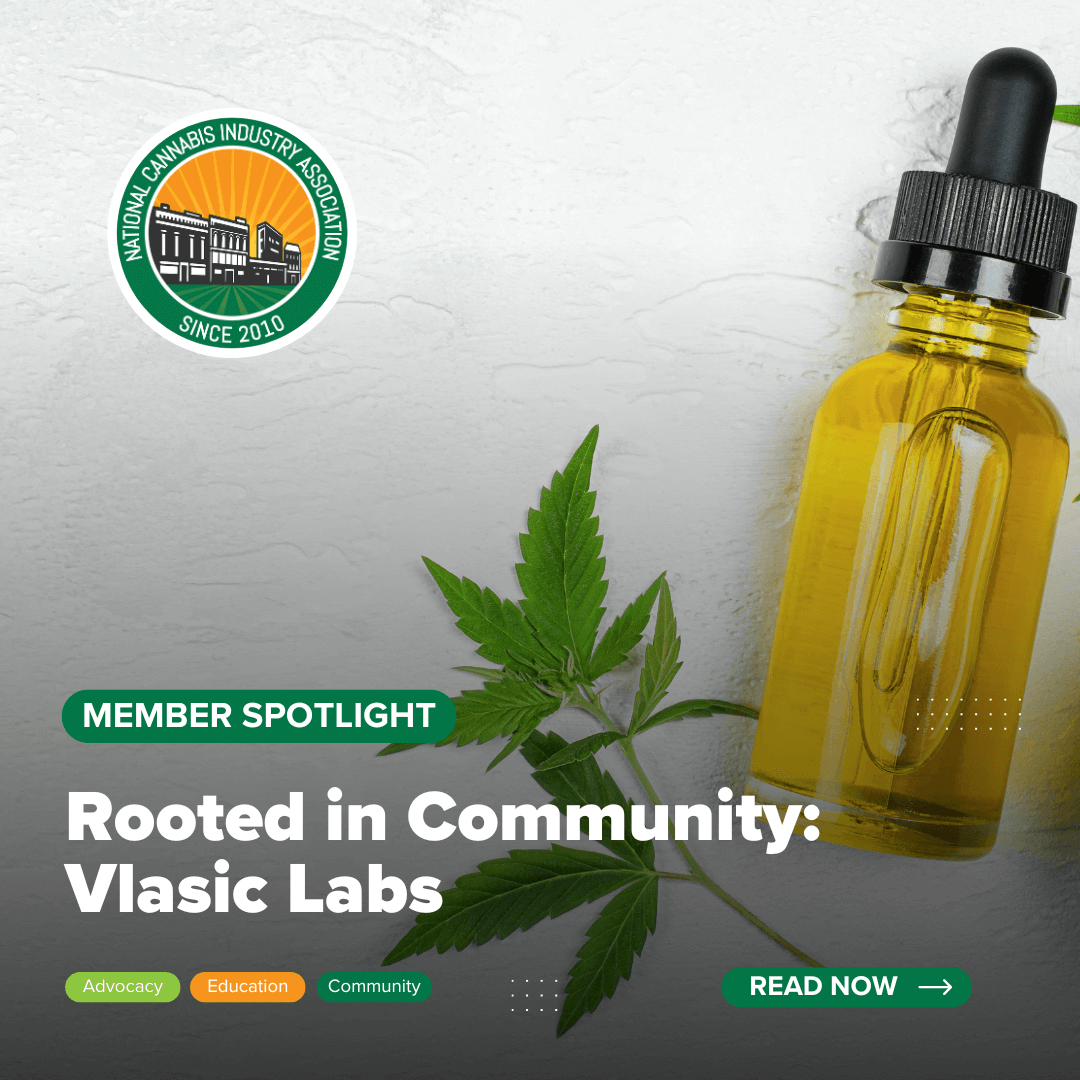
At the foundation of NCIA is a vibrant community of innovators, advocates, and industry leaders united by a shared commitment to advancing a fair, inclusive, and sustainable cannabis industry. Our Rooted in Community series celebrates the members who bring that mission to life through their work and leadership. This month, we’re honored to highlight Evergreen Member Vlasic Labs.
NCIA: Can you walk us through the products and services Vlasic offers and the customers you’re focused on supporting?
Vlasic Labs: CBD CBG and CBN Topicals, Tinctures, Gummies and Pet products for anyone looking to improve their lives through affordable natural wellness.
NCIA: What sets your company apart from others in your market?
VL: The Vlasic brand brings a level of comfort and trust for customers that are new to CBD or cannabis. For long-time customers of the space, they recognize the value per milligram they are getting when they purchase Vlasic. Being able to resonate with the masses in an industry that still deals with the stigma of the past is our superpower.
NCIA: In what ways has your company evolved over time in terms of strategy, offerings, or market focus?
VL: Our company has evolved multiple times and will continue to do so as this industry changes and our customers provide feedback. Right before COVID, we started as a hemp extraction lab and our original differentiator was being one of the first labs to convert CBD into CBN. This led us to launch our first finished product, a CBN Sleep Spray. The initial success of this product led to expansion of more SKUs and eventually partnering with grows to launch Vlasic Flower as well. On the flower side, we entered and exited the Michigan market within a couple of years and now are focused on Missouri and Nevada. We hope to continue growing our national presence on the CBD side, while strategically selecting which states make the most sense for further flower expansion.
NCIA: What inspired your decision to join the NCIA community, and what value do you see in being part of the organization?
VL: We joined NCIA to stay actively involved in policy decisions and the network of industry leaders shaping the future of cannabis access. Our mission to make cannabis-based wellness more affordable and trusted depends on strong industry standards, smart regulation, and collaboration with others committed to long-term progress. NCIA provides that connection and helps us operate with clarity and purpose in a fast-moving environment.
NCIA: Can you share an example of a meaningful relationship you’ve built through your NCIA membership?
VL: At NCIA Lobby Days, we met Mariah James Bond, founder of the Montana Cannabis Coalition. That relationship gave us the access, insight, and local support needed to enter the Montana market. Without that introduction, we would not have had a path into the state.
NCIA: What NCIA moment stands out to you most?
VL: One of our most meaningful NCIA moments was in 2018 when our partner Adam Rosenberg attended his first Lobby Days in Washington, D.C. He met directly with lawmakers, worked alongside other industry leaders, and saw the importance of coordinated advocacy firsthand. That experience was a turning point in his career, and he now serves as Chairman of the Board.
Vlasic Labs demonstrates how transformative it can be when community is placed at the heart of leadership. Beyond delivering thoughtful, customer-first service, they actively champion the future of the cannabis industry through advocacy and leadership. As longtime NCIA members, and through Board Chairman Adam Rosenberg’s leadership, they continue to help shape critical conversations around equity, access, and reform. We’re grateful for the meaningful impact Vlasic Labs is making to move the industry forward.
Together with our members, NCIA is building a stronger, more equitable cannabis industry. One rooted in community and driven by shared purpose. Join the community. Join NCIA.
Rooted in Community: FundCanna

A stable and equitable cannabis industry depends on access to smart, reliable financial solutions. At NCIA, our network includes financial innovators who help businesses grow responsibly and sustainably. Through our “Rooted in Community” series, we highlight the members driving that progress. This month, we’re proud to spotlight Evergreen Member and NCIA Board Member Adam Stettner, CEO and Founder of FundCanna – the leading source of capital for the cannabis industry nationwide.
NCIA: What financial solutions does FundCanna provide, and which segments of the cannabis industry benefit most from your services?
Adam Stettner: FundCanna provides short-term, non-dilutive financing to licensed cannabis businesses, including cultivators, manufacturers, distributors, retailers, and ancillary providers. We help operators manage cash flow, move faster, and grow sustainably without giving up ownership.
In 2025, we expanded that mission with ReadyPaid, the first embedded B2B Buy Now, Pay Later (BNPL) solution built specifically for the cannabis supply chain. ReadyPaid gives sellers immediate payment and buyers flexible terms, addressing one of the industry’s biggest challenges — delinquent receivables — while FundCanna’s broader financing solutions work to fuel growth, stabilize cash flow and keep capital moving throughout the legal market.
NCIA: How is the cannabis industry evolving in your state, and are there any state bills or policy priorities where NCIA members’ support could make a meaningful impact?
AS: We work nationally and have funded clients in 43 states, so they all matter. Our home state is California, where the legal cannabis market is mature and consolidating. Many smaller operators are finding it harder to compete under high tax burdens, rising compliance costs, and persistent pressure from illicit operators. While demand remains, the regulated market has to work harder to stay viable.
A recent win came with AB 564, which resets the state’s excise tax to 15% (from 19%) through 2028, giving licensed businesses a bit more breathing room.
If NCIA members support measures that reduce unnecessary tax pressure, bring regulatory clarity, and level the playing field with illicit channels, that strengthens the entire ecosystem from operators to service providers like us.
Personally, I believe the entire plant deserves a fair and legal framework.
NCIA: What motivated FundCanna to join NCIA, and how does the organization’s mission align with your own?
AS: Advocacy plays a vital role in shaping policy in ways that individual companies simply cannot and we understand that collective representation is essential for creating systemic, long-term change.
FundCanna joined NCIA to help strengthen the financial foundation of the cannabis industry. For me, it’s about listening to the needs of the community and advancing fair access to capital and responsible growth for legitimate operators.
We joined to do the work, not just talk about it. We actively support NCIA’s mission through advocacy, education, and by helping more cannabis businesses take part in those same conversations. Through that effort, we’ve sponsored more than 100 operators to join NCIA, ensuring the people driving this industry forward also have a voice in shaping its future.
NCIA: How does NCIA membership contribute to FundCanna’s mission and long-term vision for the industry?
AS: NCIA allows FundCanna to actively support and help shape the future of the cannabis industry by learning, networking and advancing reasonable regulations and laws. For us, it’s an opportunity to stay close to the issues that matter most to our clients and to contribute where we can add value.
Membership also keeps us grounded. It’s a reminder that progress in cannabis depends on collective effort and that the best ideas often come directly from the operators living it every day.
NCIA: Tell us about a relationship NCIA membership has helped you build?
AS: NCIA has helped us build meaningful relationships across the supply chain. We’ve connected with operators, advocacy groups, and policymakers who share a commitment to building a stronger, more sustainable industry. Some of those connections have become long-term partnerships, both through the businesses we fund and the organizations we support.
It’s a reminder that progress in cannabis doesn’t happen in isolation. The more we collaborate, the better this industry becomes for everyone involved.
I value my fellow board members greatly. They’re smart, innovative and dedicated to viable business practices for cannabis.
NCIA: From a customer’s perspective, what makes FundCanna stand out from competitors?
AS: FundCanna exclusively serves the cannabis and hemp industries. We understand how operators run their businesses and the challenges that come with managing cash flow. Unlike traditional lenders or investors, we move quickly and only focus on debt and factoring.
We bring more than 20 years and nearly $20 billion of funding/lending experience in consumer and commercial lending. Our focus is partnership over transactions, offering ongoing support and transparency to help clients grow sustainably in a challenging, evolving market. On average, clients who work with us grow their businesses by more than 70 percent.
I often say we’re like the ultimate business partner. We provide the funding with no ownership. We don’t tell you what to do, but we are always available to support growth and smoothing cash flow.
NCIA: What is a favorite memory you associate with the NCIA community?
AS: Lobby Days in D.C., easy!
NCIA: What have been the most significant changes or milestones in your company’s journey since it began?
AS: We launched FundCanna in 2021 to solve one problem: access to capital for licensed cannabis operators. The goal was simple: give this industry the same kind of financial tools every other industry takes for granted. In just a few years, we have reviewed nearly 6,000 applications, approved nearly $500 million, and funded almost $250 million to operators across the country.
What began as a straightforward funding platform has grown into a financial infrastructure company for the cannabis economy. We have built technology that delivers faster underwriting and real-time funding decisions. In 2025, we’ve expanded that innovation with ReadyPaid, a Buy Now, Pay Later program that brings predictability and transparency to how businesses pay and get paid, solving the delinquent and disjointed account receivable issue.
Today, FundCanna is not just filling a gap. It is helping define what financial access in this industry should look like. We continue to invest in technology, data, and partnerships that strengthen liquidity, trust, and stability across the legal market.
Dedicated members like FundCanna are the backbone of NCIA’s community. United by a shared belief in the future of cannabis, we’re building an industry that will stand as a vital force in the national economy. One that is fairly taxed, responsibly regulated, and accessible to the patients who need it most. Thank you, FundCanna, for being truly Rooted in the Community!
Alongside our members, NCIA is building a stronger cannabis industry driven by shared purpose. Join the community, join NCIA.
Plan Your Visit to DC and Be In The Room Where It Happens

As someone who has been a cannabis lobbyist for more than a decade, I’m pretty willing to bet that you’ve said at least one of these things aloud (or to yourself!) at some point:
- I can’t believe Congress didn’t pass SAFE Banking!
- What’s wrong with those people in D.C.? Why don’t they understand topic/issue/concept?
- What’s taking policymakers so long?!
If that sounds familiar and you’re ready to take your expertise to the halls of Congress, keep reading about how you can do just that.
NCIA’s 14th Annual Cannabis Industry Lobby Days | May 12-14, 2026
NCIA is heading back to Washington, D.C. May 12-14 for the 14th Annual Cannabis Industry Lobby Days, kicking off with the National Stakeholder Summit. This year’s program arrives at a pivotal moment for our industry, and for federal cannabis policy writ large.
It’s a midterm election year, cannabis rescheduling is on the horizon, and control of Congress could potentially shift, so the stakes could not be higher.
Midterm elections fundamentally shape the legislative landscape. Committee leadership, party control, and legislative priorities can all change in a matter of months. For the cannabis industry, this uncertainty underscores the importance of engaging policymakers now – before election pressures intensify and policy windows close.
Lobby days attendees will receive talking points, pre-event training, be placed on a team, and be provided with a pre-set meeting schedule. Lobby days also provides NCIA members with the unique opportunity to meet directly with congressional staff (and maybe even lawmakers themselves!) while decisions are still being formed, not after the fact.
At the same time, the industry stands on the brink of historic change. Indeed, rescheduling has the potential to reshape tax policy, research barriers, medical access, and business operations across the country, but rescheduling alone will not solve all of the industry’s challenges. Policymakers need to understand what comes next: how federal agencies should implement changes, where Congress must act to provide clarity, and how to avoid unintended consequences for state-legal operators, patients, and consumers.
Advocacy is especially critical at this moment because decisions are not being made in a vacuum. Opponents of reform are actively lobbying to slow progress, attach harmful provisions to must-pass legislation, and frame cannabis through outdated and inaccurate narratives. If industry voices are absent, those perspectives risk filling the void.
Showing up in Washington sends a clear message: the cannabis industry is organized, informed, and committed to responsible federal policy. It highlights our collective power: yes, individual meetings matter, but coordinated advocacy that’s grounded in shared priorities and consistent messaging is what drives lasting change. By coming together under the NCIA banner, members amplify their impact and reinforce the association’s role as the leading voice for the regulated cannabis industry. Lawmakers take note when they hear aligned messages from businesses, operators, and advocates across the country.
National Stakeholder Summit | May 12, 2026
The National Stakeholder Summit opens the week on May 12, grounding our advocacy before we head to Capitol Hill. Through a series of panel conversations, operators, regulators, and policy leaders will dig into the forces shaping cannabis policy right now.
These discussions are designed to connect what’s happening on the ground with what’s unfolding in Washington. From the implications of rescheduling to national trends emerging across state markets, the Summit creates shared context before we head to Capitol Hill.
By the end of the Summit, participants are prepared to advocate with clarity, consistency, and confidence, grounded in real-world experience and shared priorities.
The National Stakeholder Summit is open to all. NCIA members receive complimentary access.
Make Plans to Join Us
Right now is one of those unique moments where showing up really matters. I want to personally encourage you to register for Lobby Days & the National Stakeholder Summit, start thinking through travel plans (those flights are only going to go up in cost!), and carve out the time to join your fellow members in D.C. Being in the room, telling your personal story, and advocating together makes a real, tangible difference. More details are coming soon, including meeting logistics and preparation tips to help you make the most of your time in Washington. I’ll see you in D.C. in May!
Rooted in Community: Fox Rothschild

At the core of NCIA is a dynamic network of business owners, advocates, industry professionals, and entrepreneurs all working towards a shared mission – cultivating a fair, inclusive, and thriving cannabis industry. Our “Rooted in Community” series highlights the members who strengthen and shape that vision every day. This month, we’re proud to spotlight Evergreen Member Fox Rothschild, a premier legal leader in the cannabis community, uniting more than 1,000 attorneys from coast to coast. The firm delivers the expansive reach and robust resources of a national practice while maintaining the personalized service and deep relationships typically found in a boutique firm.
NCIA: What problem does Fox Rothschild help solve in the market?
Fox Rothschild: The cannabis industry operates amid a web of complex, and often conflicting, state and federal laws that are difficult for businesses to navigate. That is where we come in. Our firm regularly advises cannabis operators, investors, and businesses on the full spectrum of legal issues – from licensing and regulatory compliance to corporate transactions, real estate taxes and employment matters. By combining deep industry knowledge with practical legal strategy, we help clients minimize risk, stay ahead of regulatory shifts and seize new opportunities in a rapidly evolving market.
NCIA: How is Fox Rothschild different from competitors in this space?
FR: Ranked by Chambers USA as a Band 1 law firm for Cannabis Law, our attorneys advise cannabis clients across the country on how to navigate a complex web of state and federal laws involving corporate formation, financing, banking, compliance, intellectual property, tax, employment and real estate. But what really sets us apart is our approach: we invest the time to get to know our clients and understand their needs so we can better develop creative strategies that drive results. Bottomline, we find ways to help cannabis businesses navigate this fast-changing, highly regulated industry with confidence.
NCIA: Why did you join the movement with NCIA?
FR: We joined the National Cannabis Industry Association (NCIA) almost a decade ago because we wanted to be at the center of the conversations shaping the industry’s future. Many of our clients and the companies we care about are active members in the NCIA and value the association’s role in advancing thoughtful policy, responsible growth and collaboration across the cannabis sector. By actively engaging with NCIA, our team gains valuable insights into the evolving regulatory and business landscape, allowing us to better anticipate challenges, identify opportunities and provide informed, strategic counsel. Being part of this community keeps us connected to real-world issues impacting operators and investors. It also reinforces our shared commitment to supporting a sustainable and equitable cannabis industry.
NCIA: Why is membership important to you?
FR: Our NCIA membership is invaluable. It allows us to stay connected to the people and issues driving this rapidly evolving industry. NCIA provides a unique forum where industry leaders, advocates and professionals can exchange ideas and address shared challenges. Through NCIA’s resources, network and events, we learn how to better support our clients and contribute to a more transparent, responsible and sustainable cannabis marketplace.
NCIA: Tell us about a relationship your membership has helped build?
FR: Fox Rothschild was proud to represent the NCIA pro-bono in December 2024 at a landmark hearing on the DEA’s proposal to reclassify marijuana as a Schedule III drug. Our liaison, Michelle Rutter Friberg, NCIA’s Director of Government Relations, was our boots-on-the-ground resource during the (now adjourned) hearing. Her knowledge and track record proved invaluable for us, and we continue to appreciate her insights.
NCIA: How has Fox Rothschild evolved since it started?
FR: We were among the first national law firms to launch a dedicated Cannabis Law Practice, positioning our team as trailblazers in this rapidly evolving industry. Over time, the practice has grown to include other leading attorneys in the Cannabis Law space, including some who are now at the forefront of efforts to reschedule cannabis. Fox attorneys now serve clients in every jurisdiction that has legalized medical or recreational cannabis, including California, New York and Pennsylvania. Our evolution mirrors the growth of the industry – innovative, strategic, and results driven.
Longstanding members like Fox Rothschild are the heart of NCIA’s community. A community grounded in the belief that the cannabis industry will become a robust and essential part of the national economy. We envision an industry that is fairly taxed, responsibly regulated, and readily accessible to the patients who rely on it most. Thank you, Fox Rothschild, for being truly Rooted in the Community!
Together with our members, NCIA is building a stronger cannabis industry – rooted in community and driven by shared purpose. Join the community, join NCIA.
NCIA Accepting Applications For 2026-2028 Board of Directors Term

NCIA is now accepting applications for eligible candidates to apply for the board through December 10, 2025.
The National Cannabis Industry Association is a nonprofit organization run for and by its membership, so we hope you’ll consider this opportunity to apply for a seat on the NCIA Board.
Serving on NCIA’s Board of Directors is no small task. Board members are responsible for overseeing the strategic direction of the largest and most influential cannabis industry organization in the country. Board Members are also responsible for building membership, fundraising, and ensuring that NCIA continues to be the strongest force advocating for the fair and equal treatment of the industry on Capitol Hill.
Learn more about our current Board Members
Annual Board Selection Process
Current NCIA members in good standing are eligible to apply for a seat on the board. NCIA members who are interested and qualified to serve on our board are encouraged to submit an application for review by our nominating committee before the December 10 deadline.
Candidates may apply directly for a board position during the open application process. The application form asks for information about the candidate’s professional background, unique talents, skills, and viewpoints, and ability to contribute or raise financial resources for NCIA. Candidates must be fiduciaries of a NCIA member-business or be designated by a company fiduciary to serve on our board.
Who Qualifies To Run For A Board Position?
To be considered for a seat on the board, a candidate must be a fiduciary (e.g. owner, president, CEO) of a current member business at any level of membership or must be a representative of the business that has been appointed to serve by a fiduciary. Candidates must submit an application online by 11:59 p.m. on December 10.
What Are The Requirements For An NCIA Board Member?
Board members serve two-year terms and are responsible for overseeing the association’s overall strategy and budget, assisting in the development of strategic relationships, and serving as ambassadors of NCIA, which represents hundreds of member businesses. In general, the NCIA board meets in person twice per year and conducts monthly video conferences.
How Are The Board Positions Selected?
Once the application period closes, NCIA’s Nominations Committee will convene to carefully review and score all applications. The committee will ultimately select a slate of nominees to fill eight (8) available board seats that are best suited to bring additional talent, resources, and diversity to our growing organization, based on their qualifications.
Our Nominating Committee will comprise the chairs of our 13 member committees as well as a select number of current board members whose terms are not expiring this year. Once the Nominating Committee selects the slate of eight members will be notified at the end of this year.
SUBMIT AN APPLICATION
Rooted in Community: Nice Guys Delivery

The heart of NCIA is a powerful network of business owners, industry professionals, and entrepreneurs who share a common goal: building a fair, inclusive, and thriving cannabis industry. Through our “Rooted in Community” series, we shine a light on the members who help support and shape that vision every day. This month, we’re proud to feature Evergreen Member and NCIA Board Member Monica Gray-Fong, co-founder of Nice Guys Delivery – a retail delivery & distribution company leading the industry with a deep commitment to political advocacy and community. Since joining NCIA in 2017, Monica has been a dedicated advocate for the industry by participating in Lobby Days, speaking at our conferences, contributing to webinars, and serving on our Board of Directors for the past 5 years. We’re proud to have Monica and Nice Guys Delivery as part of the NCIA community and honored to represent their work and values!
NCIA: Give us a snapshot of Nice Guys Delivery. Where you operate, who you serve, and what makes your work unique?
MG: Nice Guys Delivery primarily serves individuals in California, particularly in Marin County, who are looking for high-quality, lab-tested cannabis products. Our customers likely include both recreational users and those seeking cannabis for wellness purposes. For those that cannot access cannabis by going to a Dispensary, we bring relief right to your doorstep.
NCIA: California is often seen as the heart of cannabis, especially since it was the first state to legalize medical use. But from an insider’s perspective, what’s the reality of working in the cannabis industry in California today?
MG: Ugh. California is terrible. The industry in CA is failing. Shrinking. AB564 already passed but the industry was failing before the tax increase and AB564 merely kept us at 15% and did not decrease it. They also just put a ban on intoxicating HEMP products. Not sure how much further that will take our industry…..
NCIA: What motivated you to join NCIA?
MG: Nice Guys Delivery is deeply committed to advocating for small business owners and the customers they serve in the cannabis industry. By joining the National Cannabis Industry Association, we are ensuring that our voice – and the voices of our patients and customers – are represented in shaping the future of the industry. This highlights our dedication to not only providing quality products and services but also to influencing policies and decisions that impact small businesses and the broader cannabis community.
NCIA: Can you share a favorite NCIA memory – perhaps a relationship or connection that your membership helped you build?
MG: Speaking on the SAFE(ER) banking panel at the conference in Long Beach. Meeting some really great people at that conference and being able to give my two cents on why banking is such a huge hurdle for the industry.
I have met so many wonderful people at the NCIA. I’ve met our current General Council, our Insurance Broker and so many other partners and collaborators throughout the years.
NCIA: How does Nice Guys Delivery stand out from the competition?
MG: We were one of the first delivery services licensed in CA after prop 64 passed. We’ve been around since 2016 (almost 10 years?!), been through the pandemic as an essential business, have been through every regulatory hurdle and have seen many of our friends in the industry come and go.
NCIA: 10 years is such an accomplishment in cannabis! How has your company evolved since it started?
MG: OMG. This is an essay in itself. It was just myself and my husband at first. The business was incorporated 2 weeks after I gave birth to our first son in 2016. We now have 40+ employees, 9 vehicles, 4 units in our building, so many systems integrated, security upgrades and more. I can go on and on about why my hair is now turning white.
NCIA: Any final words on why NCIA membership is valuable to Nice Guys Delivery?
MG: It is important that our voice is heard and at the table when cannabis reform happens at the National Level.
Monica and Nice Guys Delivery personify what it means to be truly rooted in community. Not only by serving their customers with care, but by standing up for the future of the cannabis industry through their advocacy and leadership. As a longtime NCIA member and Board leader, Monica’s voice continues to shape critical conversations around equity, access, and reform. We’re honored to spotlight her journey and grateful for the work she and Nice Guys Delivery are doing to push the industry forward.
Together with our members, NCIA is building a stronger cannabis industry – rooted in community and driven by shared purpose. Join the community, join NCIA.
Cannabis Reform in Washington: What’s Moving, What’s Stalled, and Why Your Voice Matters
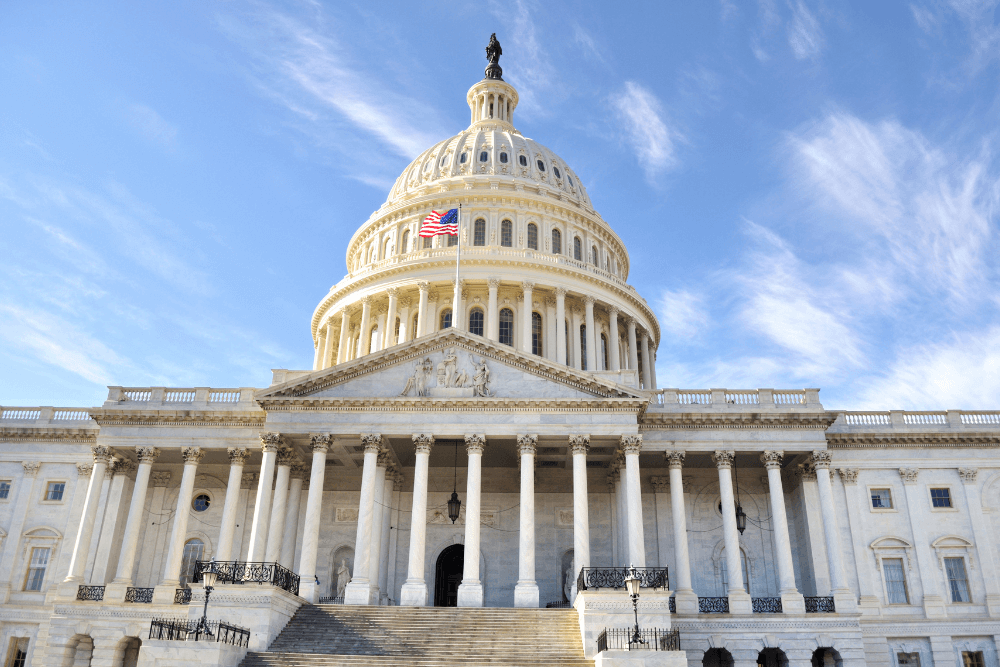
While cannabis reform has always moved at a glacial pace in Washington, D.C., 2025 seems like an extreme example. To date, Congress has introduced almost no standalone legislation related to the issue and efforts to reclassify marijuana have stalled; but the Supreme Court of the United States (SCOTUS) has seemed more willing to examine the topic.
Let me be clear, though: your voice matters and you can make it heard easily by using NCIA’s action alerts to contact your member of Congress about medical marijuana protections, 280E, and/or hemp.
All of that said, with legislators back home in their home states/districts, I thought it would be a perfect time to recap what has (and hasn’t) happened so far in reform this year by looking at each branch of government:
Administrative
At the beginning of the year, Donald Trump was sworn in for his second term as President. President Trump and his administration were, for the most part, inactive on cannabis policy reform during his first term- with the notable exception of his then-Attorney General, Jeff Sessions, rescinding the Cole Memo in early 2018. That said, the President and his current administration seem to be considering making moves on this issue.
You may recall that the Biden Administration previously initiated the rescheduling process, prompting a notice of proposed rulemaking (NPRM). (You can read more about NCIA’s role in that process here.)
Fast forward to this year: in January some of the pro-rescheduling plaintiffs (not including NCIA) filed an interlocutory appeal and accused the DEA of colluding with prohibitionists (and that their approach was unlawful). The filing of this interlocutory appeal caused an indefinite pause on the proceedings and, for all intents and purposes, ended these historic hearings.
Now, it seems like there may be some new developments. Last week, reports from CNN and the
Wall Street Journal stated that officials are reexamining cannabis policy and was followed by the President himself saying that his administration is “looking at” a proposal to reschedule marijuana and will “make a determination over the next few weeks.”
This comes after the Senate recently confirmed Terry Cole as the new Administrator of the DEA. NCIA sent a letter to Administrator Cole following his ascension to the office and looks forward to participating in and guiding any efforts to reclassify marijuana under federal law.
Legislative
In the almost 11 years that I’ve been at NCIA, there’s typically been no shortage of cannabis related bills introduced in Congress- until now.
The 119th Congress has been disappointingly inactive on cannabis policy this year. To date, only one substantive pro-cannabis bill (STATES 2.0) has been introduced on the topic.
Unfortunately, efforts to undermine the cannabis industry have also been introduced, such as the H.R. 1447/S. 471, the “No Deductions for Marijuana Businesses Act”, which seeks to make the unfair 280E tax rule permanent for state-legal cannabis businesses – regardless of how cannabis is scheduled in the Controlled Substances Act. You can take action against this punitive bill by sending a letter to your members of Congress using this tool.
All of that said, Congress has been working on the federal budget (also known as appropriations bills). Both the House and Senate versions of the FY 2026 Commerce–Justice–Science (CJS) appropriations bills include the long-standing rider prohibiting the Department of Justice (DOJ) from spending funds to interfere with state medical cannabis programs, however, the House’s version would place a critical caveat on these protections and proposes that the Justice Department still be able to enforce a section of U.S. code that calls for increased penalties for distributing cannabis within 1,000 feet of an elementary school, vocational school, college, playground or public housing unit. If passed into law, this language puts hundreds of facilities and patients at risk. Again, please consider reaching out to your Representative via NCIA’s action alert tool on this critical topic.
Judiciary
The SCOTUS hasn’t issued any major merits rulings directly on marijuana this year, but several cannabis-related matters have either been brought before the Court or had petitions filed. In April, “SCOTUS ruled in favor of a trucker who sued a cannabis company after he was fired over a positive THC test that he says was caused by consuming a hemp-derived CBD product”. According to Marijuana Moment, the justices’ decision means he can seek triple damages from the company that made the product under a federal anti-racketeering law (RICO).
The highest court in the land (no pun intended!) may also review another cannabis related case soon. Just days ago, the Trump administration asked SCOTUS to take up a case on the federal government’s ban on users of marijuana and other illegal drugs from owning firearms and uphold the prohibition, basically asking SCOTUS to deny marijuana users their 2nd Amendment rights.
There’s no doubt: federal reform takes time, effort, and engagement. Policy change cannot and will not happen without your help, so again, please use NCIA’s action alerts to contact your member of Congress about medical marijuana protections, 280E, and/or hemp.
How to Tell If Your THC Gummies Are Premium Quality

Some THC gummies just hit better. No weird aftertaste, no sudden crash, and definitely no guessing if it’s working. You take one, and it feels… right.
Then there are the others. The ones that feel off from the start—too sweet, too melty, too all-over-the-place with the effects.
The difference usually isn’t about the dose. It’s about the details: what’s in them, how they’re made, and how transparent the brand is about it.
Because once you know what to look for, spotting premium-quality THC gummies gets a whole lot easier.
Look Beyond the Buzzwords: Ingredients Tell the Real Story
Labels can look impressive at first glance. Words like “organic,” “vegan,” or “all-natural” show up everywhere—but they don’t always mean the product is clean or high quality. You have to go deeper.
Here’s what actually matters when checking the ingredient list:
- Pectin instead of gelatin: Pectin is fruit-based, vegan, and easier to digest. It also holds up better in heat. Most well-made gummies now use this instead of animal gelatin.
- No artificial dyes or sweeteners: Bright colors and syrupy flavors might seem fun, but premium gummies skip the junk. Look for natural colors and sweeteners like cane sugar or tapioca syrup.
- Infused—not sprayed: Sprayed gummies are often inconsistent. Infused ones mix the THC evenly throughout the batch, so you’re more likely to get a balanced effect every time.
- Clear breakdown of cannabinoids: The label should tell you exactly what’s inside: how many milligrams of THC, and whether any minor cannabinoids like CBG or CBC are included. “Full-spectrum” means nothing if it’s not explained.
At the end of the day, a solid ingredient list isn’t just about what’s in your gummy—it’s also about what’s not.
Third-Party Lab Testing Is Non-Negotiable
You know what’s more important than how a gummy tastes or even how it hits? What’s actually in it. That’s where lab testing comes in.
And no, not just a label that says “lab-tested.” We’re talking about real, third-party results—posted clearly, not buried somewhere you’ll never find. Because if you’re putting something into your body, you deserve to know exactly what it is.
A proper lab report should show:
- Exact THC levels, so you’re not guessing at the dose
- A clean pass on pesticides, heavy metals, and mold
- A full cannabinoid breakdown, not just THC—because minor cannabinoids matter too
Some brands get this right. They make it easy to scan a QR code and pull up all the data—batch by batch. You’ll find that the most trustworthy THC gummies come from companies that want you to read the fine print. That kind of openness? It’s not marketing—it’s confidence.
Dosing That’s Consistent and Actually Makes Sense
One of the most frustrating things about THC gummies? When one knocks you sideways and the next barely makes a dent.
That kind of unpredictability doesn’t just mess with your experience—it’s a red flag.
With premium products, you should know exactly what you’re getting in every bite. No surprises, no guesswork.
Here’s what that looks like:
- Clearly labeled milligrams per gummy – Not just “25mg per pack,” but broken down per piece.
- Batch consistency – Each batch should deliver the same potency as the last. This usually comes down to good extraction methods and proper infusion—not spraying distillate on the surface.
- Dosing that aligns with real-world effects – 10mg should feel like 10mg. If it doesn’t, something’s off with either the blend or the quality.
- Microdosing options – Reputable brands often offer low-dose gummies too (2.5mg–5mg), so you’re not forced into a higher high than you want.
Consistency isn’t just about effects—it’s about trust. When the dose makes sense and stays steady, you can actually plan your experience.
Packaging Isn’t Just Aesthetic: It Actually Matters
Most people have, at some point, picked THC gummies just because the jar looked cool. But if that’s all the packaging offers, it’s not doing its job.
With THC gummies, packaging isn’t just about shelf appeal — it’s what keeps the product safe and effective until the last piece.
Here’s what to pay attention to:
- Opaque containers → Sunlight messes with potency. If light can get in, the gummies might not stay as strong as they should.
- A tight, resealable lid → Air dries them out. Moisture can make them sticky or worse, moldy.
- Child-proof design → If it pops open too easily, that’s a problem. Safety should never be optional.
- Real info on the label → Not just branding fluff. Dosage, batch number, expiry date, and place of origin should be printed clearly.
Good packaging shows the brand cares after the product is in your hands — not just when it’s on a shelf or screen.
Conclusion
With THC gummies, quality isn’t just about how they taste or how strong they feel—it’s in the details. The ingredients, the testing, the dose, even the jar it comes in… all of it matters. Once you know what to look for, you start to spot the difference fast. And honestly, if you’re going to put something in your body, it’s worth knowing it’s made right.
2025 NCIA Committee Highlights: A Mid-Year Recap
The first half of 2025 has brought NCIA committee members together each month to discuss industry trends, changing regulations and how those are impacting their businesses. NCIA committee members have been busy producing some great content this year as well! Follow the links below for a quick recap of some of the blogs & webinars you may have missed from these industry leaders.
Luckily, there are four more months for our current crew of committee members to keep creating the most valuable content for our industry. Can’t get enough of NCIA Committee knowledge? Sign up for our newsletters to see the newest educational resources. Want to share your knowledge and expertise? Reach out to Committees@thecannabisindustry.org to see where you can plug in and get engaged!
Member Blog: INSIGHTS Matter – The Value of NCIA Lobby Days
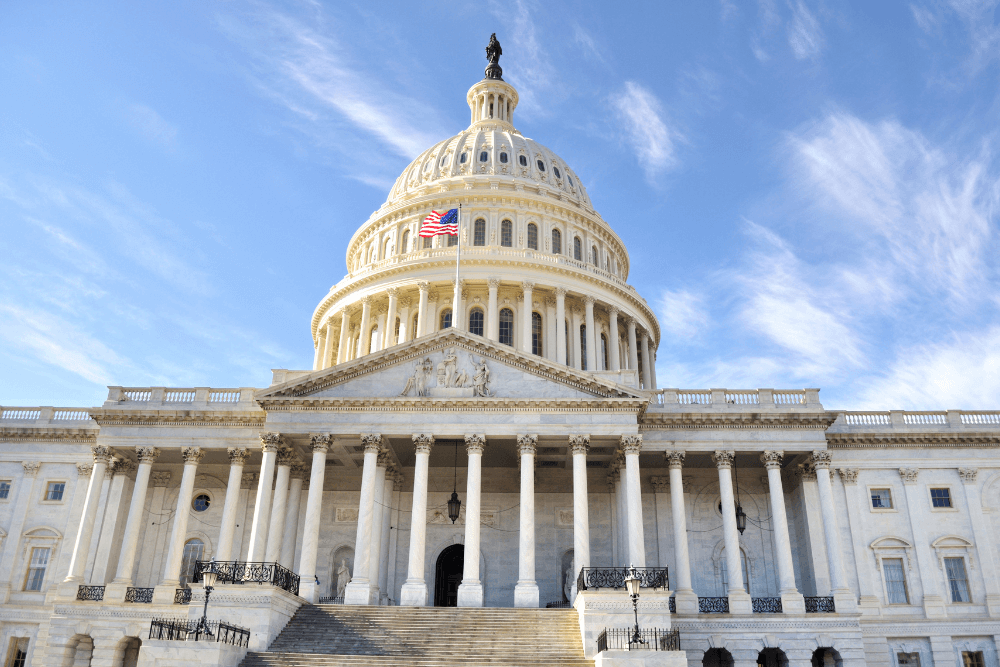
This spring, Cannabis NewsHub partnered with the National Cannabis Industry Association (NCIA) to spotlight the voices of cannabis industry leaders in a special series: INSIGHTS Matter – The Value of NCIA Lobby Days. The goal? To explore why attending NCIA Lobby Days is not just important—but impactful for businesses, professionals, and the future of our industry.
Launched in tandem with NCIA’s April 3rd webinar, Committee Insights: The Value of NCIA Cannabis Industry Lobby Days, this campaign asked a simple question:
What are your insights on the value of attending NCIA Lobby Days?
The response was clear—and overwhelming. More than 15 NCIA members, including NCIA Co-Founder & CEO Aaron Smith and Chairman Adam Rosenberg, shared their perspectives on the importance of showing up, speaking out, and being part of the solution. These reflections—ranging from CEOs and researchers to dispensary operators, medical advocates, marketing professionals, and policy experts—paint a vivid picture of how direct advocacy shapes cannabis policy in real time.
“NCIA’s Lobby Days are a powerful example of advocacy in action, where members directly engage with lawmakers to drive meaningful change. Over the past decade, I’ve witnessed how these events not only influence policy but also empower participants to actively contribute to shaping the future of our industry.”
— Aaron Smith, CEO & Co-Founder, NCIA
“NCIA Lobby Days brings value to its members by driving policy change that reduces barriers to doing business, from tax reform to banking access.”
— Adam Rosenberg, Chairman, NCIA
These testimonials—and more—were amplified across Cannabis NewsHub’s social media platforms and website, reinforcing the collective strength of our member-led movement. Read all the posts here.
Why This Matters: A Look Back at Lobby Days 2025
This year’s campaign coincided with NCIA’s 13th Annual Cannabis Industry Lobby Days and the inaugural National Stakeholder Summit in Washington, D.C. Over the course of 36 hours, NCIA members completed more than 100 meetings on Capitol Hill, directly educating lawmakers and staff on the most pressing issues facing cannabis operators today.
From advocating for long-overdue policy reforms—like the SAFE Banking Act, STATES 2.0, and Section 280E relief—to meeting with key congressional committees, NCIA members helped shape the narrative and build momentum for meaningful change.
The event kicked off with the National Stakeholder Summit, which provided attendees with policy briefings, best practices, and strategies for staying engaged after the meetings end. The summit also served as a bridge for non-members to get involved and witness the value of NCIA membership firsthand.
These efforts are already making an impact. In the weeks following the event, several members of Congress who met with NCIA participants have signed on as co-sponsors to priority legislation.
Your Business. Your Voice. Your NCIA.
Joining NCIA isn’t just about access to events or updates. It’s about being part of something bigger—a movement to ensure that cannabis businesses like yours have a seat at the table and a say in the laws that shape our future. Whether you’re advocating for fair banking, equitable taxation, or consistent federal regulations, NCIA equips you with the tools, training, and platform to be heard.
And when we show up—we move the needle.
Thanks to all the members and partners who contributed to the INSIGHTS Matter campaign and helped shine a spotlight on the critical importance of our shared advocacy efforts. We’re grateful for your voices, your time, and your commitment to driving this industry forward. ᐧ
ᐧ
Committee Blog: Cybersecurity and the Risks of Technological Failures in Cannabis

Recently, one of the biggest names in cannabis, Metrc, has come under scrutiny following a lawsuit from a former-employee alleging that the nation’s largest seed-to-sale tracking software provider was actively involved in a conspiracy to allow for “illegal interstate” cannabis sales. The former employee, Marcus Estes, who worked as an executive vice president for a year at Metrc, alleged that the company did not identify questionable activity within its data to California state regulators despite having a $40 million annual contract with California requiring that they “flag irregularities.”
Now we won’t dive into every detail associated with this lawsuit specifically, but we did think this is an opportune time to raise awareness about some of the risk cannabis business face when it comes to cybersecurity and what to do when technological procedures with the operations fail.
Seed-to-Sale Compliance
What does make this Metrc story particularly newsworthy is that of all the technological elements associated with a cannabis business, perhaps none are more essential to operational readiness than the seed-to-sale system. For those who may be unaware, seed-to-sale is more often than not a requirement for cannabis licensure and is essential for documenting and tracking cannabis from its plant form to its final product form on a dispensary shelf.
For any reputable cannabis business, having a compliant seed-to-sale system is crucial. But it’s not just about selecting the right vendor for your needs, but continuing to monitor the systems subsequently in place. This is a risk mitigating step that is often overlooked by current operators and can often lead to illicit activities—be it intentionally or unintentionally. From a compliance perspective it’s always recommended to: maintain constant oversight, perform regular check-ins and audits of the systems; and, be an active business when it comes to relations with the seed-to-sale provider while being sure to ask your vendor how they are addressing the most topical issues in the cannabis industry.
Cybersecurity and Hacking
In a poll from MJBiz Daily, 59% of cannabis companies said that they had not taken steps to prevent cyberattacks. Ransomware attacks are a constant in business operations these days, not just with cannabis. Recently companies and business as varied as DaVita, Kuala Lumpur International Airport, and IKEA have gone through the grueling process of dealing with malware attacks. Most notably, these attacks are on the rise with ransomware attacks increasing some years by upwards of 150% and the amount victims of said attacks also rising by more than 300%.
Ultimately, one of the shrewdest and easiest steps a cannabis business can do to better address the risk inherent with hacking and cybersecurity is to address the culture of such and make employees more cognizant of the risk. As observed in another NCIA blog, “Any cultural shift at an organization needs to start from the top, and that includes security. Security culture needs to be driven from the top. Adopting proper policies and procedures to properly safeguard organization networks and personnel is key. This includes regular employee training. As many as 95% of attacks are caused by human error.”
What to Do with Irregularities
There are countless “irregularities” which can occur in the realm of cybersecurity. But what exactly can one do to address those and bolster their own risk management strategies? The first, as mentioned earlier, is to make sure the business has a culture which understands the inherent risks of cybersecurity and technological failures. This involves having robust policies and procedures, training which occurs at the time of hiring new employees and annually, and offering anonymous reporting structures.
Additionally, it’s vital to invest in security hygiene. This includes multi-step authentication, cybersecurity specific trainings and guides to address phishing or smishing, and reviewing best practices with vendors used. And when such security issues arise, what is one to do? When in doubt, raise concerns up the proper channels within your business. Be sure to document the irregularities thoroughly, including with timestamps. If necessary, discuss matters with legal counsel and be sure to notify the necessary state agencies too.
Ultimately, the risks for cybersecurity are high for any business, but are even higher for a business such as one in cannabis which relies on technology for operational compliance and has less vendor options available than other businesses to work with. Finding the best—from vendors to employees to SOPs—is essential for good, smooth, and compliant practices.
Make Your Voice Heard: Why You Can’t Afford to Miss NCIA’s Annual Lobby Days & National Stakeholder Summit

It’s no secret that the cannabis industry is in dire need of reform. Businesses are struggling, consolidation is rampant, and communities continue to bear the costs of prohibition. At the same time, partisan gridlock has made progress at the federal level more challenging than ever. The cannabis industry—its business owners, employees, and advocates—feels the weight of uncertainty, cynicism, and frustration.
But one thing is certain: change doesn’t happen without action. That’s why there’s no better investment in the future of your business and the industry than attending NCIA’s 13th Annual Cannabis Industry Lobby Days and the inaugural National Stakeholder Summit in Washington, D.C., from May 13-15, 2025.
A New Era of Advocacy Begins with the National Stakeholder Summit
For the first time, we’re launching the National Stakeholder Summit, a deep dive into the policy challenges and regulatory shifts shaping the cannabis industry. This is where business meets policy, and where industry leaders set the stage for the advocacy that follows.
NCIA members enjoy complimentary access to the Summit, while non-members can attend for just $100. If you’re not yet a member, there’s never been a better time to join NCIA and unlock full access to this high-impact event.
Lobby Days: The Most Important Advocacy Event of the Year
After the Summit, NCIA’s 13th Annual Cannabis Industry Lobby Days provide a unique opportunity for cannabis professionals, business owners, and advocates to directly influence federal policy. As the industry continues to expand, engaging with lawmakers is essential to advancing sensible regulations, protecting businesses, and pushing for federal reform.
At Lobby Days, attendees will educate members of Congress and their staff on key industry priorities, including:
✅ Banking access
✅ 280E tax reform
✅ Federal legalization
✅ Criminal justice reform
✅ Sensible regulations for hemp products
Even more importantly, this is your chance to share your personal story. Lawmakers need to hear directly from industry professionals about the real-world impact of federal policies. Personal engagement can significantly influence legislative decisions and demonstrate the economic power and legitimacy of the cannabis industry.
Why Showing Up Matters
Beyond advocacy, Lobby Days offers unmatched networking opportunities, allowing you to connect with other business leaders, policymakers, and industry stakeholders. These relationships are critical for staying informed, forming strategic partnerships, and ensuring long-term success in the cannabis space.
This isn’t just about being seen—it’s about being heard. And the best way to ensure your voice carries weight is by standing with the largest and most influential cannabis trade association in the country.
Reserve Your Seat at the Table
NCIA’s Lobby Days is an exclusive, members-only event. Not yet a member? Join today to secure your spot and be part of the movement shaping the future of cannabis.
Already a member? Register now to stay up to date on our agenda, training sessions, and more.
Want to Maximize Your Impact?
Consider sponsoring Lobby Days to amplify your company’s voice and position yourself as a leader in cannabis advocacy. Sponsorship opportunities help you stand out before, during, and after the event.
Be in the room. Be part of the movement. Join us in Washington, D.C.
I look forward to seeing you there—just don’t forget to pack comfortable shoes!
Michelle Rutter Friberg
Director of Government Relations, NCIA
Member Blog: How Cannabis Insurance Can Safeguard Your Business from Legal Risks

The cannabis industry is growing rapidly, yet with this expansion comes a complex array of legal risks. From compliance with regulations to managing liability claims, cannabis businesses face unique challenges that require specialized insurance solutions. Cannabis insurance provides essential protection, enabling businesses to operate legally and securely while minimizing potential financial hazards.
This article explores how cannabis insurance can safeguard your business from legal risks, outlining vital coverage options and the importance of risk management in this evolving industry.
Understanding Legal Risks in the Cannabis Industry
Businesses in the cannabis industry need to grasp the legal difficulties that affect them. The cannabis business operates under strict regulatory parameters which make businesses exposed to major market challenges stemming from compliance problems and legal complications. Several of the most frequent legal risks encompass:
Breaches of Regulatory Compliance
All cannabis companies must follow every law enacted by the federal government and state authorities, together with regional ordinances. Business operations face severe consequences when any compliance violation occurs, regardless of intention since it leads to potential business shutdowns or heavy fines together with legal action. Insurance coverage helps pay for the legal expenses that arise from compliance cases.
Lawsuits for Product Liability
Users may encounter safety risks when using cannabis products that include edibles and tinctures, and vaporizers. Experiencing negative reactions from customers who believe their product is faulty could trigger expensive legal proceedings for a business. The insurance protects companies in case clients bring product liability claims.
Claims Related to Employment
Possible legal challenges arising from workplace discrimination combined with unfair dismissal and harassment issues affect all industries including cannabis. EPLI provides coverage to pay for legal costs and compensation required in employment claims.
Property and Theft Hazards
The expensive marijuana stock maintained by cannabis companies makes them especially vulnerable to theft incidents. Business disruption can occur because of fire incidents combined with vandalism or natural disasters damaging property. The coverage provided by property insurance enables businesses to recuperate after experiencing such events.
Cybersecurity Risks
Cannabis companies currently use online systems to store sensitive corporate and client information. Businesses which obtain cyber liability insurance gain safeguarding against financial consequences and data breach losses together with hacking incidents.
Key Insurance Policies to Protect from Cannabis Operations
Businesses operating in the cannabis industry must buy specialized insurance plans that protect them against relevant dangers. Several mandatory insurance protection plans exist, which include:
1. General Liability Insurance
General liability insurance helps businesses avoid legal expenses after claims from external entities when these entities suffer property damage or experience customer injuries. Every cannabis business needs this policy for essential protection purposes.
2. Product Liability Insurance
Product liability insurance protects businesses from legal consequences that stem from releasing dangerous defective products onto the market. Additions to legal costs and settlement payments, together with damages awarded during legal cases, fall under the scope of this insurance.
3. Workers’ Compensation Insurance
Through the workplace policy employees can receive medical care together with income benefits when their job injuries occur. The manual nature of cannabis businesses necessitates workers’ compensation insurance due to the high risks of workplace injuries.
4. Property Insurance
The protection given by property insurance provides monetary compensation for physical structures including dispensaries along with warehouses and cultivation buildings. This policy protects organizations by paying for costs arising from fire damage as well as theft events and natural disasters.
5. Employment Practices Liability Insurance (EPLI)
Employment Practices Liability Insurance which you may also know as EPLI, protects cannabis businesses from employment-related lawsuits that might occur when employees face discriminatory action and harassment at work and unfair termination.
Benefits of Cannabis Insurance for Legal Protection
Investing in cannabis insurance provides numerous benefits in addition to financial protection. Here are several important advantages:
1. Ensures Compliance with State Laws
Numerous states mandate that cannabis companies possess certain types of insurance to fulfill their licensing obligations. Possessing appropriate coverage guarantees adherence and avoids licensing problems.
2. Minimizes Financial Losses
A business unprepared with insurance faces financial challenges when trying to afford costs of court procedures and payment of settlements. Insurance alleviates the monetary stress of legal actions and claims.
3. Enhances Business Credibility
Being insured at proper levels represents both professional conduct and responsible management of accountability. A cannabis business protected by proper risk management attracts more customers and investors together with business partners who demonstrate trust in its operations.
4. Protects Business Owners and Employees
Insurance provides legal advocacy along with monetary support when defending against lawsuits to shield both organizations and their personnel against unpredicted legal responsibilities.
5. Reduces Business Interruptions
Unexpected incidents, such as theft or property damage, can disrupt operations. Insurance helps businesses recover quickly by covering losses and repair costs, minimizing downtime.
Choosing the Right Cannabis Insurance Provider
Choosing the appropriate insurance company is essential for thorough coverage. Here are several important factors to keep in mind:
1. Industry Experience
Select an insurance provider that specializes in cannabis policies and comprehends risks particular to the industry.
2. Policy Customization
Seek out providers that deliver customized coverage choices suited to your business requirements, regardless of whether you run a dispensary, cultivation site, or distribution firm.
3. Reputation and Financial Stability
Investigate the insurer’s financial stability, customer feedback, and claim handling effectiveness to guarantee dependability.
4. Compliance Knowledge
Due to variations in cannabis laws among states, collaborate with an insurance provider that remains informed about changing regulations to guarantee compliance.
Conclusion
Risk management for the cannabis industry requires proactive strategies since insurance serves as an essential component among such approaches. Companies that invest in wide-reaching cannabis insurance coverage protect themselves from regulatory fines and legal actions as well as property damage and multiple types of liabilities.
Businesses that adopt proper insurance coverage mechanisms get protected from financial instability and also gain regulatory compliance while enhancing their credibility and building enduring business success. The cannabis sector’s development requires businesses to obtain suitable coverage that minimizes their risks and enables secure business operations.
Committee Blog: Announcing Winners of NCIA’s State Regulatory Committee 2024 CannaStar Awards

National Cannabis Industry Association’s State Regulation Committee announces 2024 award winners for cannabis regulatory and program rollout success in 8 states
State-level cannabis regulations are a moving target; or rather, 50 moving targets. Despite nationwide movement in nearly every US state towards a regulated, adult-use market, each state has approached cannabis sales with their own unique flair.
Although it has been fun to watch each state’s program mature under their own particular point of view, as we move forward into 2025 our committee wants to call attention to some of the states we feel are getting it right.
The National Cannabis Industry Association State Regulatory Committee (NCIA’s SRC) hopes that by highlighting the successes (some of them unlikely) in individual states, we can inspire states to come together to share best practices, work towards eliminating redundancies for multistate operators, and create a streamlined framework that allows for greater access to the market for both would-be operators and consumers.
Without further ado, here are the National Cannabis Industry Association State Regulatory Committee’s CannaStars for 2024!

Best Social Equity Program: Illinois
Through the Illinois R3 Program (Restore, Reinvest, Renew), 25% of Illinois cannabis tax revenue is reinvested into communities disproportionately impacted by the War on Drugs, funding initiatives like job training, reentry services, and legal aid. Since launching, this has amounted to $244M in marijuana-funded revenue grants to community organizations that address disinvestment and excessive incarceration in Illinois.
Illinois also prioritizes social equity applicants for licensing by offering additional points on applications, reduced fees, and conditional licenses for roles such as craft growers and transporters. Further, the Cannabis Business Development Fund provides low-interest loans and grants to social equity applicants, helping reduce financial barriers to starting a cannabis business.
Like every state, Illinois continues to navigate the complexities of implementing a fair social equity program. However, the state has also backed up their commitment to restorative justice with criminal record reform. They have identified more than 770,000 records of “minor cannabis offenses” that may be eligible for expungement.
Currently, of the 25 jurisdictions with legal adult-use cannabis programs, 18 have an active social equity program. NCIA’s SRC believes that Illinois leads the nation with a model for social equity within cannabis that truly prioritizes a fair, restorative model.

Best Hemp Regulation: Kentucky
Kentucky’s hemp program stands out as a model of safety, transparency, and innovation due to its prioritization of registration and rigorous testing of hemp products. In Kentucky, all hemp-derived cannabinoids must undergo purity testing and remain compliant with THC limits. Packaging and labeling must also be clear and meet rigorous standards, similar to those in the adult-use markets of other states.
Although enforcing hemp producers and sellers to comply with tight standards has been met with some controversy, NCIA’s SRC believes that Kentucky’s efforts are a good thing and reinforce trust in the marketplace for consumers. California’s outright ban on intoxicating hemp derived products in 2024 has made it clear that lax regulations on hemp put the reputation of the entire cannabis industry at risk.
Beyond safety, Kentucky’s Cabinet for Health and Family Services does an outstanding job fostering collaboration. They engage farmers, processors, and retailers through education and support, and are transparent about regulatory changes and best practices. Their forward-thinking approach has positioned Kentucky as an ideal place for farmers and cultivators throughout the country.

Best Balance of Cannabis and Hemp Regulations: Minnesota
When Minnesota voted to legalize adult-use cannabis in 2023, the state already had a thriving hemp-derived THC product market. Instead of bulldozing the existing hemp market, Minnesota has instead worked to bridge the gap and create a cohesive framework that supports existing businesses, innovation, while also prioritizing public safety and further economic growth.
One of Minnesota’s key strengths is its integrated approach to regulation: hemp and adult-use cannabis are regulated centrally. This is a substantially different model than many other states, where cannabis and hemp are managed by separate regulatory bodies. By overseeing hemp-derived THC products and cannabis under a unified system, the state avoids market confusion and ensures consistent quality standards.
By carefully integrating cannabis and hemp regulation, Minnesota has positioned itself as a model for other states. NCIA’s SRC believes that the Minnesota model – a two-tiered system where lower THC products can be manufactured and sold more readily while higher concentrates of THC are sold through a traditional adult-use framework – merits consideration nationally as a way to increase access, safety, and roll-out adult-use without disrupting existing businesses.
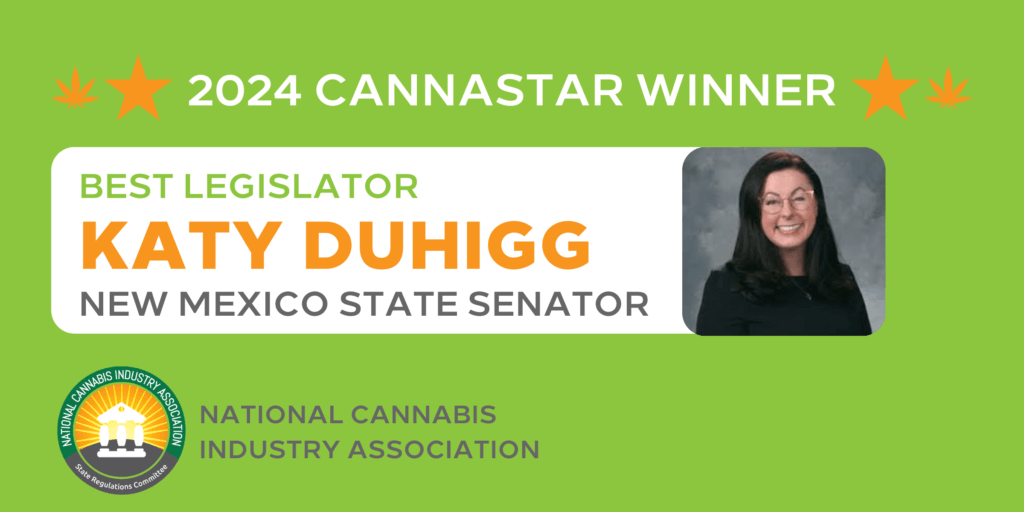
Best Legislator: New Mexico State Senator Katy Duhigg
Elected in 2021, Senator Katy Duhigg (D) represents Albuquerque Senate District 10. Duhigg is the former Albuquerque City Clerk, with a background in election and consumer protection. As a State Senator, she brings extensive cannabis knowledge to her role, and has been critical in allowing New Mexico to emerge as an unlikely success story in adult-use cannabis.
Senator Duhigg serves as Chair of the Senate Rules Committee, and as Vice Chair of the Senate Judiciary Committee, where cannabis-related legislation enjoys the most rigorous discussion. Her commitment to the cannabis industry was witnessed during her very first legislative session, wherein the Cannabis Regulation Act was passed, legalizing cannabis for adult use in New Mexico.
The Cannabis Regulation Act was signed by Governor Lujan Grisham in June, 2021 and New Mexico was able to roll out their program quickly and effectively. Less than a year later, on April 1, 2022, New Mexico was open for business. There are now 3,071 active license holders (as of December 4, 2024).
Since the passage of the CRA, Sen. Duhigg has been absolutely integral, leading the charge in the Senate to improve the enabling legislation and to ensure New Mexico’s cannabis industry continues to mature, with strong equity protections that include uplifting the existing medical operators who have been serving the state since the beginning of New Mexico’s medical cannabis program in the 1970s.

Best Age Verification Guidelines: Nevada
Cannabis is frequently subject to “think of the children” style regulations and moral panic, but states often miss the mark when actually trying to put guidelines in place that protect minors and keep products out of their hands.
Nevada is still the first, and only, state to require any type of ID authentication to detect fake and suspicious IDs, and the Nevada Cannabis Control Board remains the most well-educated regulatory body on the subject of the forensic document analysis required to actually separate adult users from minors presenting false identification.
Furthermore, in March 2023, Nevada Assemblyman Brian Hibbets introduced AB342 – special interest legislation – that would have required onerous, and expensive third party checks as part of the Nevada dispensary age verification process. The Nevada State Legislature smartly shot down this amendment, which was vendor-specific language desperately seeking a problem that doesn’t exist in a state where every dispensary is doing the absolute most to detect fake IDs and keep minors out.
As of May 2024, Nevada is also the only state to include any guidelines for age verification of cannabis purchase via eCommerce, or age verification for cannabis delivery. This makes Nevada the top state in the nation for preventing underage sales, but with a common-sense approach that doesn’t try to add unnecessary burdens to their cannabis operators.

Best Challenge to the DEA: Georgia
In 2023, Georgia took the bold step of deploying their medical program directly into independent pharmacies across the state. With a limited product mix and a nascent patient base, this was an innovative way to jump-start a program and avoid high capital costs. The program was on track to get 90% of the medical cannabis patient base accessible within a 30-minute drive within 6 months of launch.
Unfortunately, in November 2023, the DEA sent an ominous letter to ice the exciting new rollout, reminding pharmacists that cannabis is still a Schedule I substance. However, instead of capitulating to the threat, the industry persisted and the state stood by to support the program with 52 pharmacies remaining active license holders. NCIA’s SRC celebrates Georgia’s commitment to medical cannabis patients and increasing access, in spite of federal threats.
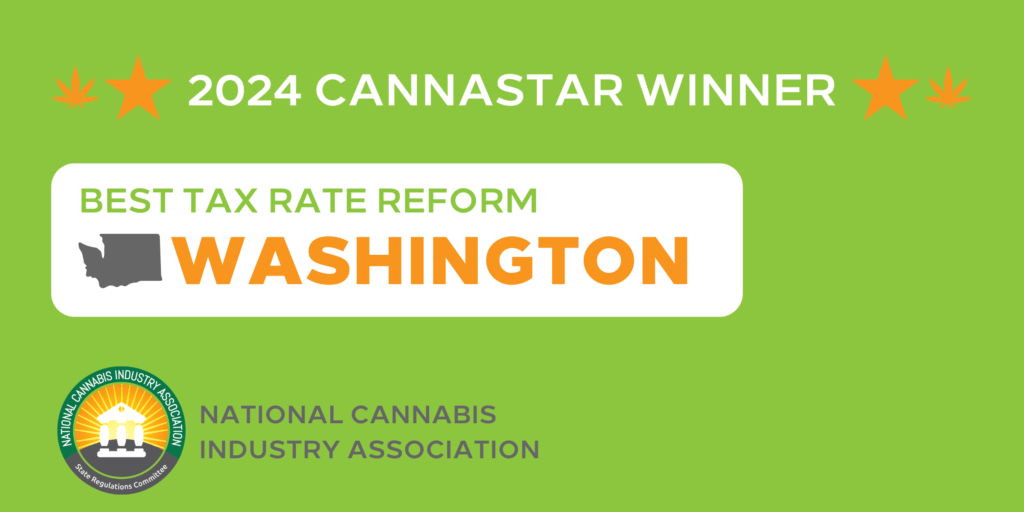
Best Tax Rate Reform: Washington State
The culmination of a 5-year effort finally succeeded in removing all state taxes from Washington Department of Health-compliant products when purchased by registered medical patients. This matches the standards for pharmaceutical purchases in nearly every US state, where prescribed medications are non-taxable. Washington now joins 10 other states who do not tax medical cannabis purchases.
Since 2016 The Cannabis Alliance, Washington’s largest cannabis trade organization, has been advocating for the reduction or removal of the 37.5% state excise tax on medical cannabis products. Now, as of June 6, 2024, registered medical patients can purchase prescribed cannabis tax-free, a nearly 50% reduction in total cost to medical consumers. The state also introduced new higher testing standards for medical products, a patient registry, and a medical cannabis consultant license provided to budtenders.
Although adult-use cannabis in Washington still remains subject to a 37% tax, and the NCIA SRC acknowledges that taxes are needed to continuously fund state cannabis programs, we want to highlight Washington as the first state in the nation to treat medical cannabis as a medical necessity under the tax code, easing consumer financial burdens, and helping better position medical cannabis as a legitimate and needed treatment for many conditions.
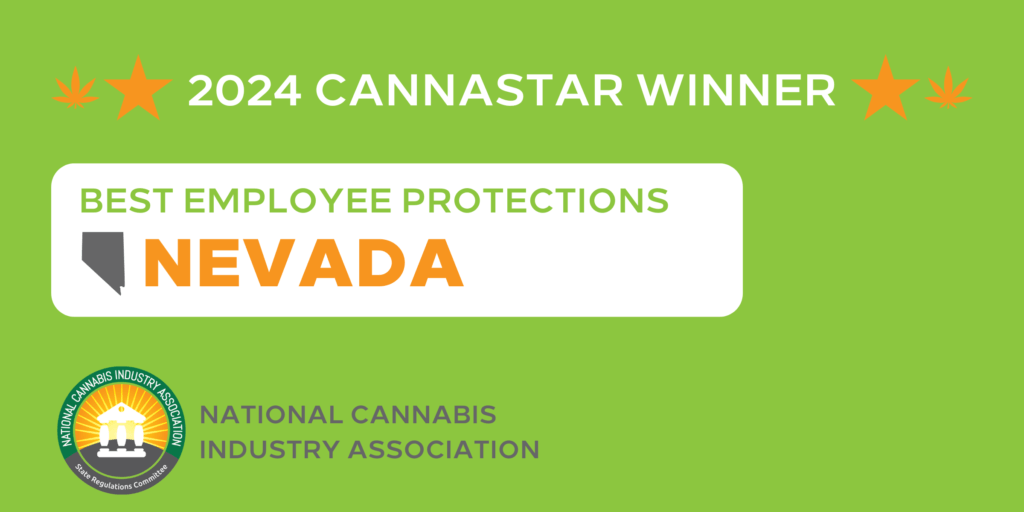
Best Employee Protections: Nevada
Nevada leads the way with some of the strongest employee protections in the United States to ensure legal users of medical or adult-use cannabis do not face workplace discrimination. In 2020, Nevada was the first state to prohibit most employers from rejecting job applicants based on pre-employment marijuana tests. This landmark legislation, codified under Assembly Bill 132, effectively protects job seekers who legally consume cannabis, while still allowing employers to maintain workplace safety standards for positions in safety, aviation, and other high risk roles. Additionally, Nevada law protects employees from penalties for lawful off-duty cannabis use. This includes the stipulation that employers cannot take adverse actions against employees for testing positive for cannabis unless there is a direct safety concern or violation of company policies.
For medical cannabis users, Nevada law goes a step further by requiring employers to attempt reasonable accommodations for qualifying medical conditions. This requirement, enacted under Assembly Bill 453, emphasizes that individuals using medical cannabis for legitimate health concerns are entitled to workplace protections, similar to those afforded to employees using other prescription medications.
Notably, the Nevada Supreme Court has affirmed employees’ right to sue for violations of these protections, cementing the legal precedent that employees have the right to challenge discriminatory actions based on cannabis use. The court’s decisions have reinforced Nevada’s position as a model for other states considering similar workplace protections for cannabis consumers. These legal safeguards represent a forward-thinking approach to balancing employee rights with workplace safety, and have set a gold standard for workplace cannabis policies across the United States.
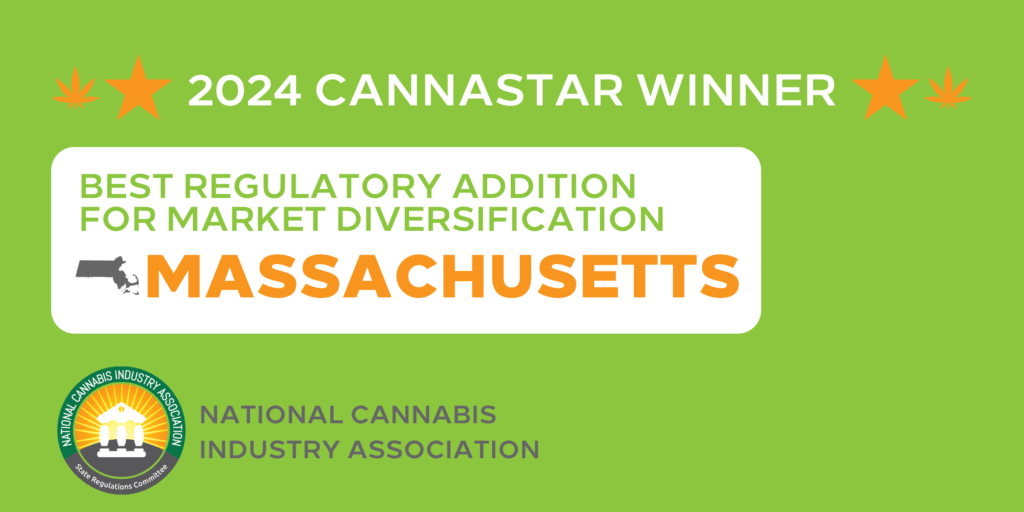
Best Regulatory Addition for Market Diversification: Massachusetts
Better late than never, the Massachusetts Cannabis Control Commission recently drafted new social consumption regulations and has moved to the formal public comment stage. As mature markets struggle with oversupply and overlicensing the rate of entity failures and state court receiverships (both voluntary and involuntary) of licensees are steadily on the rise. Massachusetts is among the first states to proactively offer a diversification opportunity for their cannabis program in the form of consumption lounges.
The draft regulations contemplate three different varieties of social consumption licenses – supplemental, hospitality and event organizer – and would restrict social consumption licenses to only Social Equity Businesses, Social Equity Program Participants, Certified Economic Empowerment Priority Applicants, Microbusinesses, and Craft Marijuana Cooperatives for the first 5 years after program launch. Supplemental licenses would be available to certain existing marijuana establishments and allow for on-site consumption within or attached to an existing facility. Hospitality licenses would permit non-CCC licensed entities to host on-site consumption events in partnership with certain existing marijuana establishments. Finally, event organizer licenses would permit certain existing marijuana establishments to host temporary consumption events.
9 states have already active consumption lounge licensing, and Massachusetts has been considering a social consumption pilot program since 2019, but the NCIA SRC wants to highlight Massachusetts for a considered approach focused on increasing revenue streams for smaller operators and social equity license holders.

Lifetime Achievement Award for Innovation: California
California has consistently led the nation when it comes to innovative and inclusive cannabis policy, going back to their first legalization ballot initiative in 1972. They were the first state to legalize medical cannabis in 1996, and today California still remains a leader in the cannabis industry, driven by its vast market, progressive regulations, and culture of experimentation.
A key milestone in this evolution was the 2024 California State Fair, which became the first state-sanctioned fair to integrate cannabis sales and consumption on-site, embracing cannabis culture into the mainstream. The state is also pioneering new business models, with cities like West Hollywood and San Francisco operating cannabis lounges that combine cannabis with art, food, and entertainment, reshaping consumption and creating new opportunities and economic growth in hospitality and entertainment.
California’s commitment to research further enhances its role as a leader, with the University of California system partnering with private enterprises to explore cannabis’s medical potential, including at the UC San Diego Center for Medicinal Cannabis Research. Together, California’s groundbreaking events and innovative business models position it as the epicenter of cannabis innovation.
NCIA’s SRC expects that California will continue to lead the way with an innovative and focused approach to growing its legal cannabis industry.
Conclusion & Congratulations
Congratulations to the 2024 National Cannabis Industry Association State Regulatory Committee’s CannaStars winners! The committee has enjoyed supporting the progress of medical and adult-use cannabis programs across the US, and can’t wait to see what new developments every state has in store for 2025.
NCIA’s Statement on Interlocutory Appeal in Federal Cannabis Rescheduling Hearing

The historic hearing scheduled to examine how marijuana is classified under federal law that could have potentially moved it into Schedule III of the Controlled Substances Act has been postponed indefinitely.
The DEA’s Chief Administrative Law Judge (ALJ) Mulrooney recently granted a request for leave to file an interlocutory appeal, resulting in the cancellation of the merit-based hearing and effectively pausing the proceedings for at least three months. With a new administration being sworn in imminently and a new DEA Administrator who has yet to be selected, future action remains uncertain.
The movants (Village Farms International, Hemp for Victory, Office of the Cannabis Ombudsman of Connecticut, et. al.) behind the request were Designated Participants (DPs) without standing who purport to be pro-rescheduling, despite the fact that their motion will require operators to continue paying the exorbitant tax rates that 280E imposes and has galvanized prohibitionists.
The interlocutory appeal was filed in an attempt to remove the DEA as the proponent of the rescheduling rule due to evidence the agency was biased against cannabis and had engaged in communications with prohibitionist group Project SAM and other opponents outside of the legal process.
While we agree that the DEA was unsurprisingly not free from bias, NCIA did not subscribe to this strategy because removing the DEA from its own administrative court was never a viable option and would have only resulted in delay or perhaps the end of the rescheduling process.
As the only pro-cannabis party granted standing in these proceedings, we are very disappointed in this unfortunate turn of events initiated by parties without legal standing.
“We believe this to be an ill-conceived strategy that benefits no one but the prohibitionists seeking to hinder reform,” said NCIA CEO & Co-founder Aaron Smith. “Our members need rescheduling and tax relief now, and we remain committed to advancing these reforms through whatever means available in the weeks and months ahead.”
This development underscores the importance of NCIA’s ongoing work advocating for the cannabis industry in Congress and the new administration. It will be up to the next DEA Administrator to determine the future of cannabis scheduling and NCIA will be working hard to ensure getting the process back on track is a priority.
Our pro bono legal teams at Greenbridge Corporate Counsel and Fox Rothschild are exploring every avenue possible to get the proceedings back on track and ensure meaningful progress continues.
Member Blog: CBD Oracle Launches Consumer Protection Standards to Address Industry-Wide Issues in Hemp Products

CBD Oracle has released a set of objective, expert-backed criteria to help consumers find better hemp products and lay out clear expectations for companies.
The hemp industry has been a lifeline for many farmers, but it’s a minefield for consumers. Everyone tells you to check lab reports, but much of the time they don’t include safety testing, and sometimes they’re even outright fake. Brands talk a big game about not selling to youth but then don’t check IDs on purchase or delivery. And even if you do find a brand that doesn’t do this stuff, their labels are probably still misleading and there may be unintended and unknown ingredients that even the lab doesn’t mention.
There is a lot of talk about self-regulation, but with very little top-down control, bad actors are still widespread and the challenge of finding safe, reliable, and effective products falls primarily on consumers. At the same time, honest brands are faced with competing pressures, hoping to put out products that tick all the right boxes but balance this out against profitability.
CBD Oracle set out to address these issues, interviewing 22 experts and two governmental agencies about what they’d look for in a hemp product if they were recommending one to friends, family, or patients. The result is a set of objective criteria for evaluating cannabinoid products, covering everything from the plant on the farm right through to the labeling and marketing of the finished product.
For consumers, it’s a guide for what to look out for, but for brands, it’s a blueprint for making the highest-quality cannabinoid products you can and standing out from the bad actors.
You can read the full report here: A Comprehensive Framework for Evaluating Cannabinoid Products (PDF)
The Problems With the Hemp Industry and How They Affect Consumer Trust
While the 2018 Farm Bill left the regulation of hemp products to the FDA, the agency has dragged its feet in establishing regulations and left the task to the states. The end result of this is often described as a “patchwork of regulations,” but this misses what is arguably the biggest issue: enforcement varies drastically from state-to-state and this lack of oversight means that customers cannot depend on anything, even if their state theoretically has solid rules in place.
This leaves consumers facing many issues including inaccurate labeling, deceptive marketing, unsafe products (often containing unknown and unreported byproducts), and a general lack of consistency.
For brands, this has serious knock-on effects:
- Reduced consumer trust: Consumers know that many brands don’t hit the mark, so they are more likely to stick to one or two brands they can rely on and shop around less.
- Governmental scrutiny: The lax standards in the hemp industry attract negative media coverage and in turn encourage state governments to crack down on hemp.
- Market uncertainty: The lack of trust from consumers and skepticism from the government brings uncertainty into the industry. The threat of increased regulation or even outright bans hangs over the future.
A Comprehensive Framework for Evaluating Cannabinoid Products: In Brief
CBD Oracle spoke to 22 experts from the industry, research, medicine, and the law, as well as the FDA and the California Department of Public Health, and reviewed existing standards to come up with their Comprehensive Framework for Evaluating Cannabinoid Products.
The entire framework is in CBD Oracle’s PDF report and blog post, but briefly, the experts identified several key factors consumers should look out for and the industry should strive towards.
The plant’s origin and cultivation method
The plant should be grown in the US, ideally using organic farming methods, outside under natural light, from a single strain and single origin, and preferably in states with ideal climates and robust hemp programs.
Extraction
The extract should be made from flower using a clean method that removes contaminants while preserving beneficial compounds, such as CO2, with natural cannabinoids (not converted) and terpenes (or at least 99% purity for isolates).
Third-party lab testing
There should be full-panel tests publicly available for each batch/lot of each finished product, ideally including tests of raw materials, from an accredited lab with a credible reputation, which confirms that the product is free from contaminants and the potency is within 10% of the advertised amount (20% for low-dose products). The lab report should be less than a year old and should have a QR code for easy verification.
Quality control
The company should be a GMP-certified manufacturer, with an FDA-registered facility, that oversees the entire production process (i.e. not a white-label brand) and has a chain of custody documentation. The hemp should ideally be USDA certified organic, and with NSF sport certification if it’s intended to be 100% THC-free.
Ingredients and additives
The product should be made without harmful or unnecessary additives, including (but not limited to) vitamin E acetate, synthetic fragrances, artificial colorings, parabens, or synthetic cannabinoids, shouldn’t include unregulated supplements, and any vape products should preferably use a base of propylene glycol (and/or vegetable glycerin).
Packaging and labeling
The product should comply with all labeling requirements, be packaged in a child-resistant container, with packing and expiration dates shown, clear dosing instructions, a batch/lot number for traceability, complete ingredient listing, a QR code linked to the lab report and appropriate health warnings.
Reputation, transparency, and marketing
The company should not make unapproved medical claims, use marketing intended or likely to appeal to youth, or sell hemp products without substantive age verification. They should be transparent about their team, work with experts, ideally engage in advocacy or be a member of industry organizations, and offer good customer service, including a money-back guarantee.
Conclusion – Working Towards a Better Industry
It’s likely that the upcoming update to the Farm Bill will come into force before we get any substantive regulation of hemp at the federal level, with the update likely restricting intoxicating hemp. The only way to show the industry is responsible before then is to hold it to higher standards, pushing customers to expect more and companies to do more to ensure their products are safe, efficacious, and reliable. While the criteria won’t solve the problems facing the industry, they offer a clear path forward for the industry and empower consumers to expect more of the companies whose products they buy.
You can access the full report in a PDF here: A Comprehensive Framework for Evaluating Cannabinoid Products
Be Part of a Movement, Not a Moment: Highlights from NCIA’s Fall Stakeholder Summits

This fall, the National Cannabis Industry Association (NCIA) held four Stakeholder Summits across the United States, gathering cannabis industry operators, regulators, investors, and advocates to tackle the unique regulatory, operational, and strategic challenges facing cannabis businesses today. Held in Michigan, New York, Ohio, and Southern California, these Summits offered actionable insights into the evolving landscape of cannabis regulation and taxation, fostering a spirit of collaboration and movement-building in support of a thriving, equitable industry.
Michigan Stakeholder Summit: Regulatory Adaptation and Collaborative Solutions
The Michigan Stakeholder Summit brought to light the latest regulatory shifts impacting cannabis operators in the state. From changes in the Hemp Farm Bill to Michigan’s approach to intoxicating hemp sales, the panel on “Operator Insights and Regulatory Perspectives” shed light on pressing issues. Brian Hanna, Executive Director of the Cannabis Regulatory Agency, addressed upcoming regulatory changes and discussed the need for balanced enforcement to protect Michigan’s legal market. Discussions also covered navigating compliance with agencies like the Department of Environment, Great Lakes, and Energy (EGLE) and MIOSHA, while maintaining operational efficiency.

One core theme emerged from panelists such as Rebecca Collett of Calyxeum and Allison Ireton of Bloom City Club: collaboration is essential. As the Michigan cannabis market faces evolving dynamics, including the rapid issuance of new licenses and pressures on medical caregivers, the need for a transparent dialogue between regulators and industry stakeholders remains critical. Attendees left with actionable strategies for adapting to compliance requirements, maintaining business viability, and ensuring consumer protection.
New York Stakeholder Summit: A Regulatory Landscape in Transition

In New York, the Stakeholder Summit focused on how operators can succeed in a rapidly maturing market. Led by John Kagia from the Office of Cannabis Management (OCM) and industry veterans like Jeffrey Schultz of Foley Hoag LLP, the “Operator Insights and Regulatory Perspectives” panel delved into the complexities of New York’s regulatory landscape. The session addressed social equity provisions, compliance hurdles, and strategies for growth in a highly regulated environment.

Key questions included navigating the intake process for new operators and the impact of recent enforcement actions on the illicit market. Kate Hruby of KJH Strategy emphasized the need for well-defined compliance guidelines to reduce ambiguity, while Marcella Osello of DOPE CFO Certified Advisors shared insights on the financial challenges facing small businesses in New York. The panel underscored the importance of partnerships between operators and policymakers, leaving attendees with insights on building a resilient business within a market in flux.
Ohio Stakeholder Summit: Legislative Updates and Strategic Business Growth

The Ohio Summit explored the convergence of legislation, legal complexities, and operational strategy essential for growth in Ohio’s cannabis market. Ohio State Representative Juanita Brent (D – District 22) shared updates on recent legislative actions affecting cannabis operators and emphasized the need for proactive policy advocacy, particularly as the legislative landscape shifts with changes in state leadership.

Legal experts like John Oberle of Ice Miller LLP and Helen Mac Murray of Mac Murray & Shuster LLP highlighted the nuances of Ohio’s regulatory requirements, with a focus on compliance around testing, product dosing, and advertising restrictions. Emillie Kelleher of BeneLeaves provided practical strategies for scaling a cannabis business within these parameters, underscoring the importance of understanding regulatory demands while fostering consumer trust. Ohio’s legislative season is critical for the cannabis industry, and the call to action was clear: advocate, educate, and ensure that the industry’s voice is heard as Ohio’s regulations continue to evolve.
Southern California Stakeholder Summit: Advancing Equity and Policy Innovation

In Los Angeles, top regulators, operators, and industry advocates gathered to explore the unique challenges and growth opportunities within the region’s cannabis market. Michelle Garakian, Executive Director of the Los Angeles Dept. of Cannabis Regulation, and Laura Magallanes, Deputy Chief of the Office of Cannabis Management for Los Angeles County, shared insights on compliance, while moderator Yvette McDowell guided a discussion on strengthening industry-regulator collaboration. Jazmin Aguiar, Emerging Markets Consultant for Council Member Imelda Padilla, contributed her expertise on market expansion and policy development, underscoring the importance of community engagement in regulatory planning.

Equity operator Kika Keith, founder of Gorilla RX Wellness, advocated for streamlined processes and resources to support equity businesses, while Jerred Kiloh, President of the United Cannabis Business Association, called for policy reform, including excise tax reduction, alongside stronger enforcement against illicit operators. Panelists encouraged attendees to engage in advocacy and build stronger partnerships with local agencies, presenting a path forward for a compliant, thriving, and equitable cannabis industry in Southern California.
Schedule III & Section 280E: Navigating the Future of Cannabis Taxation
Across all four Summits, the “Schedule III & Section 280E: Navigating the Future of Cannabis Taxation” panel served as a pivotal discussion into how the potential rescheduling of cannabis could reshape financial and regulatory landscapes. Featuring a diverse lineup of industry experts and regional operators from across the cannabis supply chain, the discussion highlighted the anticipated end of 280E limitations and its impact on tax planning, capital access, and broader market opportunities.
Each panel featured unique perspectives: in Michigan, Thomas Lavigne, Jay Snipes and Scott Greiper explored strategic financial planning for capital investment in a post-280E landscape and how operators could prepare for new deductible expenses. In New York, Al Foreman and Marcella Osello shared expertise on how rescheduling could influence capital markets and growth for smaller operators. In Ohio, Thomas Haren and Ashley Mosby emphasized proactive compliance and planning for tax relief, while in Southern California, Neil Rosenfield, Henry Wykowski, and Eric Kaufmann discussed the regulatory adjustments needed to fully benefit from Schedule III status, with a focus on operational scalability and tax strategy. Panelists across all locations encouraged operators to adopt forward-thinking approaches, aligning financial practices with both current and evolving regulatory environments.
Honoring Our Speakers: Driving Conversations That Shape the Cannabis Industry
The success of the Fall 2024 Stakeholder Summits would not have been possible without the expertise and passion of our distinguished speakers. These industry leaders, policymakers, and advocates generously shared their knowledge, providing actionable insights and fostering critical dialogue on the challenges and opportunities facing cannabis businesses today. We extend our heartfelt gratitude to each of them for their invaluable contributions.
Schedule III & Section 280E: Navigating the Future of Cannabis Taxation
- Thomas Lavigne, Cannabis Counsel
- Jay Snipes, West Coast Meds
- Scott Greiper, CEO & Founder, Viridian Capital Advisors
- Aaron Smith, CEO & Co-Founder, NCIA
- Al Foreman, Partner, Tuatara Capital
- Marcella Osello, Franchise Owner, DOPE CFO Certified Advisors
- Michelle Rutter Friberg, Director of Government Relations, NCIA
- Thomas G. Haren, Partner and Chair, Cannabis Practice Group, Frantz Ward LLP
- Ashley Mosby, DOPE CFO Certified Advisors
- Henry Wykowski, Principal Attorney, Wykowski & Wood
- Neil Rosenfield, Partner, Baker Tilly US
- Eric Kaufmann, Chief Operating Officer, FundCanna
Michigan Roundtable: Operator Insights and Regulatory Perspectives
New York Roundtable: Operator Insights and Regulatory Perspectives
Ohio Roundtable: Operator Insights and Regulatory Perspectives
California Roundtable: Operator Insights and Regulatory Perspectives
- Michelle Garakian, Executive Director, Dept. of Cannabis Regulation (DCR), City of Los Angeles
- Laura Magallanes, Deputy Chief, Office of Cannabis Management, L.A. County
- Jazmin Aguiar, Emerging Markets Consultant for Council Member Imelda Padilla
- Kika Keith, Owner, Gorilla RX Wellness
- Jerred Kiloh, President, United Cannabis Business Association & Owner, The Higher Path Dispensary
- Yvette McDowell, Attorney & Consultant, Yvette McDowell Consulting
Thank you to each of these exceptional speakers for advancing the conversations that define the future of our industry. Their insights and leadership continue to inspire progress and innovation across the cannabis landscape.
Thank You to Our Sponsors and Partners: A Driving Force Behind the Fall 2024 Stakeholder Summits
Platinum Sponsors

FundCanna and Bavis Fabacraft led the way as our Platinum Sponsors, opening each Summit with impactful contributions that set the stage for dynamic discussions and actionable takeaways. Their support was instrumental in creating events that inspired collaboration and innovation across all four Summits.

Silver Sponsors
Our Silver Sponsors—SC Labs, Ispire, DOPE CFO Certified Advisors, BeneLeaves, Mac Murray & Shuster LLP, Ice Miller, and SkyOne Federal Credit Union—enhanced the experience by bringing invaluable resources, expertise, and solutions to attendees. Their presence provided attendees with actionable tools and insights to navigate the ever-evolving cannabis landscape.
Allied Association & Promotional Partners
We are also proud to have partnered with organizations that share our vision for a thriving and equitable cannabis industry. Groups such as the Michigan Cannabis Industry Association, Ohio Cannabis Health & Business Summit, Work N’ Roll, California NORML, California Cannabis Industry Association, United Cannabis Business Association and Nevada County Cannabis Alliance played a critical role in outreach and engagement. Their support ensured an inclusive and diverse audience, fostering meaningful connections and shared learning.

Together, these sponsors and partners exemplify the power of collaboration and the impact of collective action. Their support not only elevated the Fall 2024 Stakeholder Summits but also strengthened our shared mission to create a sustainable and equitable future for the cannabis industry.
Thank you for being an essential part of this movement and for helping us continue to inspire, advocate, and lead as we shape the future of cannabis.
Building a Movement for Change
The NCIA’s Stakeholder Summits brought together a diverse array of voices committed to the growth and integrity of the cannabis industry. From navigating complex compliance landscapes to advocating for inclusive regulatory frameworks, the message across each session was clear: this is a movement, not just a moment. Industry stakeholders must collaborate, advocate, and actively participate in shaping the future of cannabis in the United States.
For cannabis operators, now is the time to align with the NCIA’s mission, engage in industry advocacy, and contribute to a movement that transcends individual business interests. Together, we can forge a resilient industry that not only meets today’s challenges but also paves the way for a sustainable and equitable future.
The conversation continues in 2025 — NCIA will hold follow-up Stakeholder Summits in Sacramento and Denver in Q1 and Q2, culminating with our first-ever National Stakeholder Summit in May 2025. This event will coincide with our 13th Annual Cannabis Industry Lobby Days in Washington, D.C., where we’ll unite industry leaders to make an impact on the national stage.

Join the movement — Drive meaningful change and help define the cannabis industry for generations to come by becoming a member of NCIA. Learn more about membership here.
The Power of the Ballot: Cannabis Reform Takes Center Stage in 2024

Ballot initiatives are as OG as it gets: nearly thirty years ago in 1996, California became the first state to legalize medical marijuana via Proposition 215, also known as the Compassionate Use Act. This provision exempted certain patients and their primary caregivers from criminal liability under state law for the possession and cultivation of cannabis for medicinal use- and as they say, the rest is history!
But with election day just around the corner, it’s important that we remember our roots (pun intended) and remind our friends in Arkansas, Florida, Nebraska, North Dakota, South Dakota, and Oregon that cannabis is on the ballot.
Arkansas
If you live in Arkansas you may see marijuana on your ballot, but unfortunately your vote on the measure simply won’t be counted!
The Arkansas Medical Marijuana Expansion Initiative will appear on the ballot in Arkansas as an initiated constitutional amendment, however, in late October, Secretary of State John Thurston announced that votes on the measure would not be counted. Thurston determined that proponents submitted a total of 88,040 signatures, falling short of the 90,704 signatures required. The measure was provisionally placed on the ballot because signature verification was ongoing amid the deadline for the final statewide ballot to be printed but the Arkansas Supreme Court later ruled that although the sponsors submitted enough valid signatures to qualify for the ballot, the amendment’s ballot language was misleading and that votes on the measure would not be counted.
Florida
Voters in the Sunshine State will have the opportunity to cast their vote on legalizing adult use cannabis, but with a catch: in order to pass, proposed amendments need to garner at least 60% of the vote in order to be added to the Florida Constitution.
Amendment 3 has gotten substantial media coverage: Florida Governor Ron DeSantis has been an outspoken opponent of the measure, while former President Trump has recently stated that “As a Floridian, I will be voting YES on Amendment 3 this November”.
The outcome remains uncertain, though: A recent Emerson College Polling/The Hill survey found that support for Amendment 3 is at 60 percent, while 34 percent are opposed and 6 percent remain undecided.
Nebraska
Voters in Nebraska will see two medical marijuana measures on their ballots in November, but getting there wasn’t easy: there’s been a local lawsuit and a statewide investigation into whether enough of the signatures were valid.
Both initiatives would define cannabis as all parts of the plant of the genus cannabis, including marijuana, hashish and concentrated cannabis, but not hemp as defined in state law. One effort, the Nebraska Medical Cannabis Regulation Act, would legalize possessing, manufacturing, distributing, delivering and dispensing cannabis for medical purposes and would create the Nebraska Medical Cannabis Commission to oversee the law.
The other measure, the Nebraska Medical Cannabis Patient Protection Act, would set an allowable amount of medical cannabis at five ounces; would exempt patients and caregivers from using or assisting someone else in using the cannabis; and would require a written recommendation from a health care practitioner, as well as a legal guardian or parent in the case of minors, prior to prescription.
Advocates in Nebraska tried (and failed) to get medical marijuana on the ballot in 2022 and 2023- hopefully third time’s the charm!
North Dakota
Voters in North Dakota will see Initiated Measure 5, aka the Legalization and Regulation of Cannabis, on their ballots. North Dakota voters approved medical marijuana in 2016 but rejected recreational initiatives in 2018 and 2022.
The 20-page statutory measure would legalize recreational marijuana for people 21 and older to use at their homes and, if permitted, on others’ private property. The measure also outlines numerous production and processing regulations, prohibited uses — such as in public or in vehicles — and would allow for home grow.
According to a September survey, roughly 45% of registered voters in North Dakota support Initiated Measure 5, while 40% oppose and 15% are undecided.
South Dakota
In South Dakota, voters will see Initiated Measure 29 on the ballot. Measure 29 would legalize cannabis use, possession, distribution and home grows for individuals 21 years and older and allow for limited home grow. It would restrict where individuals could possess or consume cannabis and would also allow employers to restrict an employee’s use of cannabis. To satisfy the state’s single-subject rule, the measure does not establish a commercial marketplace for licensed cultivation or dispensary sales.
This is South Dakota’s third adult-use cannabis measure to appear on the statewide ballot.
Oregon
Measure 119, known as the Unionization of Cannabis Workers Initiative, is on the ballot in Oregon as an initiated state statute. Measure 119 would require cannabis retailers and processors to submit to the Oregon Liquor and Cannabis Commission with its application or renewal of license a signed labor peace agreement between the cannabis retailer or processor and a labor organization actively engaged in or attempting to represent the retailer’s or processor’s employees.
Currently, California, Connecticut, New Jersey, New York, and Virginia have similar requirements for licensed cannabis businesses.
All of these measures will shape the narrative around cannabis reform, so whether you live in a state with a marijuana-related initiative or not- make sure you have a plan to get to the ballot box and let your voice be heard!
NCIA Committees: Now Accepting Applications For The 2025 Term!

If you want to take your industry involvement to the next level, now is the time to get join one of NCIA’s 12 member-driven committees! NCIA is excited to announce that from now until December 11, we are accepting applications for the 2025 term!
All NCIA annual members in good standing are invited to apply for an NCIA committee seat for the 2025 committee term. Blooming & Evergreen Members receive guaranteed committee placement.
NCIA Committees enable NCIA members to engage their vast and varied areas of expertise and passion to:
- Effect change and influence public opinion and policy;
- Demonstrate thought leadership;
- Expand professional and personal network; and
- Develop best practices and guidelines to shape the future of our industry.
See the full list of committees here.
APPLY TODAY
NCIA Accepting Applications For 2025-2027 Board of Directors Term

NCIA is now accepting applications for eligible candidates to apply for the board through December 20, 2024.
The National Cannabis Industry Association is a nonprofit organization run for and by its membership, so we hope you’ll consider this opportunity to apply for a seat on the NCIA Board.
Serving on NCIA’s Board of Directors is no small task. Board members are responsible for overseeing the strategic direction of the largest and most influential cannabis industry organization in the country. Board Members are also responsible for building membership, fundraising, and ensuring that NCIA continues to be the strongest force advocating for the fair and equal treatment of the industry on Capitol Hill.
Learn more about our current Board Members
Annual Board Selection Process
Current NCIA members in good standing are eligible to apply for a seat on the board. NCIA members who are interested and qualified to serve on our board are encouraged to submit an application for review by our nominating committee before the December 11 deadline.
Candidates may apply directly for a board position during the open application process. The application form asks for information about the candidate’s professional background, unique talents, skills, and viewpoints, and ability to contribute or raise financial resources for NCIA. Candidates must be fiduciaries of a NCIA member-business or be designated by a company fiduciary to serve on our board.
Who Qualifies To Run For A Board Position?
To be considered for a seat on the board, a candidate must be a fiduciary (e.g. owner, president, CEO) of a current member business at any level of membership or must be a representative of the business that has been appointed to serve by a fiduciary. Candidates must submit an application online by 11:59 p.m. on December 20.
What Are The Requirements For An NCIA Board Member?
Board members serve two-year terms and are responsible for overseeing the association’s overall strategy and budget, assisting in the development of strategic relationships, and serving as ambassadors of NCIA, which represents hundreds of member businesses. In general, the NCIA board meets in person twice and conducts 3-4 additional video conferences per year.
How Are The Board Positions Selected?
Once the application period closes, NCIA’s Nominations Committee will convene to carefully review and score all applications. The committee will ultimately select a slate of nominees to fill six (6) available board seats that are best suited to bring additional talent, resources, and diversity to our growing organization, based on their qualifications.
Our Nominating Committee will comprise the chairs of our 14 member committees as well as a select number of current board members whose terms are not expiring this year. Once the Nominating Committee selects the slate of six members will be notified at the end of this year.
SUBMIT AN APPLICATION
Member Blog: How to Master the Cannabis Retail Landscape

The cannabis industry is thriving, but with exciting opportunities come significant challenges. For dispensary owners and cannabis wholesalers, staying competitive means understanding and adapting to a rapidly evolving market.
The Competitive Cannabis Dispensary Landscape
The cannabis retail market is booming like never before. According to Statista, the global legal marijuana market was valued at an impressive $17.5 billion in 2019 and is projected to reach approximately $73.6 billion by 2027. This rapid growth presents both exciting opportunities and intense competition. In fact, with over 7,000 dispensaries operating across the United States alone, simply offering high-quality products is no longer sufficient to capture consumer interest and loyalty.
A recent report from BDSA, a leading cannabis market research firm, underscores that consumer preferences are continuously evolving. Factors such as changing regulations, the emergence of new consumption methods, and heightened awareness of wellness trends all contribute to this dynamic environment. Retailers must not only stay ahead of current trends, but also be adaptable and responsive to shifts in consumer behavior to maintain relevance in the market.
In such a competitive and fast-paced landscape, understanding your customers’ needs and preferences is paramount. This means actively engaging with your customers, gathering feedback, and leveraging data to inform product offerings and marketing strategies. By doing so, cannabis retailers can cultivate stronger relationships with their customers, ensuring they remain a trusted choice in an ever-evolving industry.
The Importance of Driving Customer Loyalty
In a competitive market, driving customer loyalty isn’t just beneficial—it’s essential for long-term sustainability and growth. Research from Harvard Business Review has shown that increasing customer retention rates by just 5% can lead to remarkable profit increases ranging from 25% to 95%. This statistic highlights the critical importance of nurturing relationships with customers. Loyal customers not only make repeat purchases, contributing to steady revenue streams, but also become passionate brand advocates. Their positive word-of-mouth can significantly enhance brand reputation, drawing in new clientele who trust the recommendations of their peers.
Furthermore, according to a comprehensive study by Zendesk, a staggering 95% of customers share their negative experiences with others, while almost half take to social media to publicly broadcast their dissatisfaction. This underscores the importance of addressing customer service issues promptly and effectively. On the flip side, research indicates that more than half of consumers are likely to make additional purchases after a positive interaction with a brand. This illustrates that exceptional customer service can create a virtuous cycle of loyalty and repeat business.
For cannabis retailers, where competition is fierce and customer choices are plentiful, delivering exceptional customer service can significantly impact the bottom line and foster long-term success. By investing in customer experience strategies, retailers can not only retain existing customers, but also cultivate a loyal customer base that propels growth and enhances brand loyalty in an ever-evolving market landscape.
Practical Next Steps for Improving Customer Loyalty
Unfortunately, there is no straightforward or single answer on how to drive customer loyalty. However, there are many things that you can implement within your business, including employee education, that will help you along the way.
Free Resources
LeafLink’s Retailer Academy is a free resource designed to empower cannabis retailers to excel in a rapidly changing landscape. Retailer Academy offers comprehensive training modules and resources that cover essential topics such as customer engagement, inventory optimization, and marketing strategies.
By providing valuable insights and best practices, the Retailer Academy equips dispensary owners with the tools they need to enhance customer loyalty and drive business growth, ensuring they thrive in an increasingly competitive market. Whether you’re just starting out or looking to refine your approach, LeafLink’s Retailer Academy is your partner for success in the cannabis retail world.
Unit 1 of LeafLink’s Retailer Academy teaches you how to gather and analyze customer data effectively. Stop guessing what your customers truly want – Unlock data-driven insights to skyrocket sales.
Here’s what you’ll learn with the FREE eBook.
- Optimize Inventory: Stock exactly what your customers crave, eliminating stagnant products.
- Empower your Staff: Transform your team into customer insights experts.
- Find Nuggets in Reviews: Extract valuable trends and feedback from social media and online reviews.
- Master Active Listening: Build staunch customer loyalty through communication.
- Easily Break-Down Data: Learn to simply analyze customer data and generate actionable insights.
Wrapping up
The cannabis retail landscape is competitive, but with the right strategies, you can thrive. LeafLink’s Retailer Academy offers the tools and insights you need to grow your business, drive customer loyalty, and stay ahead of the curve.
By understanding your customers, optimizing your inventory, and empowering your team, you can create exceptional experiences that foster loyalty and boost profits. Don’t just survive in the cannabis market—thrive with LeafLink’s Retailer Academy.
Ready to take the next step? Explore LeafLink’s Retailer Academy today and unlock the potential of your cannabis retail business.
Committee Blog: Breaking the Stigma – Cannabis in the Retail World

Published on behalf of members of NCIA’s Retail Committee
Cannabis, once relegated to the shadows of society, is making a significant push into mainstream America. However, the journey from prohibition to acceptance is faced with many challenges, particularly in the retail world. The stigma surrounding cannabis stems from historical, legal, social, and cultural factors, and lack of education, plays a role in shaping the stigma. In this blog, we’ll explore some of the roots of the stigma on cannabis and how the landscape is gradually changing.
The Historical Backdrop
The roots of cannabis stigma are deeply embedded in history. In the early 20th century, cannabis was criminalized in many parts of the world. The United States’ War on Drugs, which began in the 1970s, heavily penalized cannabis use, linking it to criminal behavior and societal decay. Media reports of cannabis users as lazy, unmotivated, or criminals; these negative stereotypes are what many believe to be true.
However, alongside this negative portrayal, there exists a rich history of cannabis as a medicinal plant. For centuries, cannabis has been used to treat a variety of medical issues. Ancient cultures across Asia, the Middle East, and Africa utilized cannabis for its therapeutic properties, including pain relief and anti-inflammatory benefits.
In more recent times, cannabis has shown promise in helping cancer patients manage symptoms such as nausea, pain, and loss of appetite. Additionally, it has been found to fight inflammation, which is beneficial in treating conditions like arthritis and multiple sclerosis. This positive history of cannabis as a healing plant is often overshadowed by its criminalization and the stigma attached to its recreational use.
Legal and Regulatory Hurdles
One of the most significant barriers to cannabis acceptance in retail is the complex legal landscape. In the United States, for instance, cannabis remains illegal at the federal level, despite being legal in several different states. This legal ambiguity creates uncertainty and fear among businesses, banks, customers as well as B2B consumers.
Moreover, the reluctance of banks and financial institutions to work with cannabis-related businesses due to federal regulations results in limited access to financial services and funding. This financial exclusion makes it difficult for cannabis businesses to operate and expand, perpetuating the stigma. It also makes it challenging for funding purposes for these businesses to continue to operate efficiently.
Social and Cultural Challenges
Public perception plays a crucial role in the acceptance of cannabis. Despite increasing acceptance, many still view cannabis use negatively and as a Schedule 1 drug, influenced by concerns about health impacts, addiction, and moral values. Workplace policies that maintain strict no-drug stances, regardless of legal status, also contribute to this negative perception. Enhancing education on cannabis can help mitigate this stigma within our culture, which in turn will aid in positioning the cannabis industry as a credible sector in the eyes of consumers, banks, and other business sources.
Retail Industry-Specific Issues
In addition, mainstream retailers are often hesitant to carry cannabis products due to fear of backlash from conservative customers or communities, which limits the visibility and availability of these products in the broader spectrum.
Furthermore, stringent marketing and advertising regulations restrict cannabis businesses from effectively reaching new customers and normalizing their products. Social Media advertising is prohibited as well as certain television channels.
Conclusion
Resolving the challenges surrounding the stigma of cannabis in the retail world requires a multifaceted approach. Firstly, education plays a pivotal role: increasing public awareness about the medicinal benefits of cannabis and dispelling myths through targeted campaigns can shift negative perceptions. Secondly, advocating for legislative reform to align federal and state laws can provide clarity and confidence for businesses to operate effectively. Moreover, fostering open dialogue among stakeholders, including policymakers, industry leaders, and the public, can promote understanding and acceptance. Lastly, mainstream retailers can be encouraged to embrace cannabis products through initiatives that demonstrate responsible consumption and highlight regulatory compliance, thereby normalizing its presence in the retail market. By addressing these aspects comprehensively, we can gradually reduce stigma and integrate cannabis as a legitimate and beneficial sector within the retail market.
Member Post: The Bank Black Program

By Cimone Casson, Cannas Capital Holdings
Social equity programs are designed to address historical and systemic inequalities but often face various specific and unique challenges that can impede their effectiveness. Despite many attempts across the country, social equity programs have yet to make the impact needed to change the trajectory of equity and equality in the commercial cannabis industry. To tackle social equity’s biggest hurdles, we have to understand two things: there is profit in diversity, and investing in minority companies is a long-term play. Although access to capital is one of the biggest obstacles that social equity awardees face, they are much bigger and divergent. Let’s discuss some of the reasons that social equity programs have not moved the needle or made an impact on emerging and sustainable minority ownership in cannabis.
Of course, the elephant in the room is access to capital issues. This is a major problem. Many social equity programs are underfunded, which limits their ability to provide the necessary resources and support to the target populations. More states have adopted state-funded cannabis grants and limited lending programs, but this structure lacks the investment resources to credit sustainable businesses. Grants and small-scale forgivable loans under $200,000 are a great steppingstone but these businesses need to establish consistent fundable business credit profiles. More banks and financial institutions have entered the cannabis space (under U.S. Department of Treasury guidelines established in 2014 and Federal Reserve Bank guidance established in 2015) and are considering lending opportunities but they need creditworthy businesses to give them more of an incentive to offer loans. Additionally, once the banking regulatory climate changes, which it will, commercial cannabis companies must be ready to take advantage of capital opportunities.
Next, many programs are designed with short-term goals in mind and may not address the root causes of inequality, which require long-term and sustained efforts. Investing in minority businesses is a long-term play. We expect minority businesses to be an overnight success, despite deeming them economically, socially, or geographically disadvantaged or to have somehow magically overcome racial and gender-based structural barriers to business entry, scaling, and sustainability that still exist. These expectations are unrealistic, the success of this industry is in inclusion. Achieving this will take the adoption of joint venture programs, supplier diversity initiatives, public and private partnerships, and strategic business planning, that have worked in other industries. We must accept the reality of social economics, in which every culture has a relationship with money. Persistent economic disparities undermine the efforts of social equity programs, as economic inequality often intersects with other forms of social inequality. Understanding the habits, views, and relationships with funds for these disadvantaged communities’ groups can aid in establishing stronger pathways to leveling the playing field and developing general wealth.
If we truly wish to overcome the many roadblocks failed social equity programs face, we have to reexamine creditworthiness. Current underwriting metrics create additional hurdles for minority businesses. Many Community Deposit Financial Institutions, banks, and lenders will have to think about credit differently and set up various avenues and pools of capital to assist diverse businesses. I suggest adopting a socio-economic underwriting system such as Cannas Capital Holdings’s Bank Black Program. Our mission is to bridge the wealth gap via four pillars Social Equity, Social Economics, Social Entrepreneurship, and Social Enterprise. We have designed an AI operating system that will perform underwriting solutions developed with unique metric criteria that consider the disadvantages and advantages of offering provisions for diverse business owners to develop social enterprises in our communities. In addition to many traditional underwriting requirements such as Management Team, Payment History, and Collateral Support, we also employ Community & Demographic Analysis, Social Capital Assessment, Institutional Support, Risk Mitigation Strategies, Long-Term Sustainability, Regulatory Compliance, and Continuous Monitoring as underwriting standards.
Improving the effectiveness of social equity programs often requires addressing these challenges through better funding, streamlined processes, robust data collection, community engagement, and a commitment to long-term, systemic change.
Member Blog: The Science of Smokeability

While there’s a lot more science involved in the cannabis industry today than back when folks were growing in closets or on hidden hillsides, none of that science has focused on the end user.
We know how to increase yield and cannabinoid production, for example, but there hasn’t been any real research done on how cultivation techniques or delivery methods affect the smokeability of the product from the consumer standpoint.
Until now, that is.
The cannabis industry is entering a new era of scientific rigor and consumer-focused research with the launch of a groundbreaking study called The Science of Smokeability (SOS). This multi-year research project, spearheaded by Custom Cones USA and the DaySavers brand in partnership with the Cannabis Research Coalition and The Network of Applied Pharmacognosy (NAP), aims to revolutionize our understanding of cannabis cultivation, processing and consumption.
Unlike previous research that primarily focused on things like cannabinoid percentages, the SOS study seeks to establish clear links between cultivation and manufacturing practices and the end-user experience. By doing so, it has the potential to transform product quality, consistency and safety across the industry.
A Comprehensive Approach
One of the most innovative aspects of the SOS study is its comprehensive approach. It combines controlled laboratory experiments with consumer research, creating a holistic view of the smoking experience. This methodology allows researchers to analyze various factors that influence cannabis quality, including mineral content, nutritional content (flushing), nitrosamines (potential carcinogens), moisture content, and their effects on ash color, smoke composition, and overall smoke quality.

On the lab side, the SOS will be led by conducted by qualified researchers from various organizations including The Cannabis Research Coalition (CRC), an academic cultivation research group that is developing advanced cultivation techniques aimed at optimizing yield and quality of medicinal cannabis, and The Network of Applied Pharmacognosy (NAP), a nonprofit organization focusing on providing quality cannabis materials and tracking the experience of users.
Dr. Allison Justice and Dr. Markus Roggen, two of the top researchers on the study are previously known for their groundbreaking work in exploring the color change of ash in cannabis smoking. The SOS study has also partnered with Controlled Chemistry, experts in cannabis smoke and inhalation studies for cannabis, leveraging cutting-edge technologies and methodologies.
“This cross-departmental research collaboration extends beyond mere acquisition of sustainable and profitable cultivation and post-harvest metrics; we are actively establishing the benchmarks for ensuring the highest standards in producing flower intended for combustion” said Justice, founder of the Cannabis Research Coalition.
To gain consumer insight, DaySavers will be paying 200 lucky people, drawn at random, to receive and smoke two pre-rolls and then provide feedback on the experience. That data will be combined with the lab work to create the final reports.
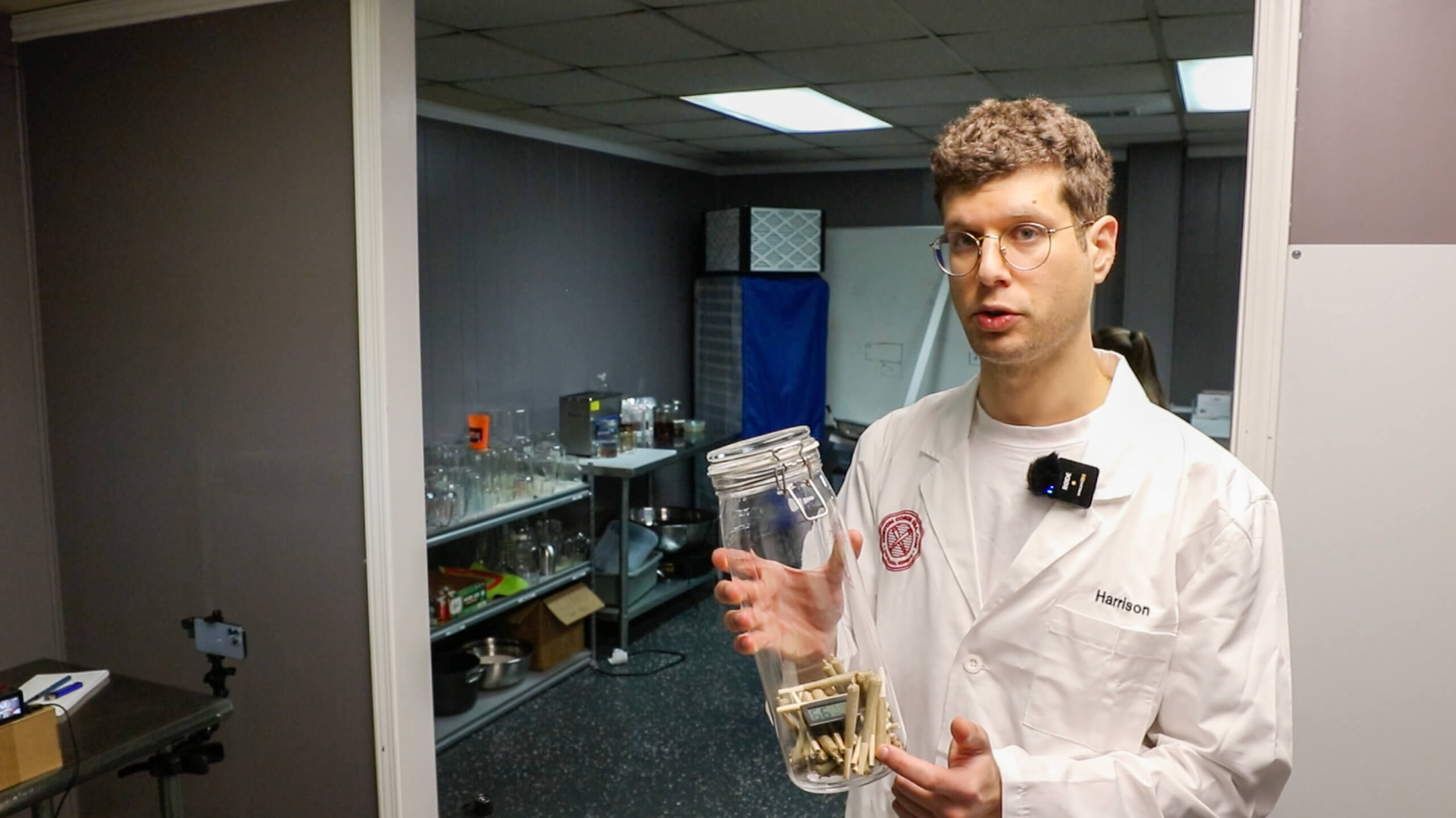
This unique and consumer-centric approach and focus on “smokeability” aligns with the industry’s growing focus on end-user satisfaction and, we hope, could lead to products that better meet consumer preferences.
Developing Standards
The first phase of findings is expected to be published in the coming months and will demonstrate how to optimize cultivation metrics to save time, money and resources while enhancing product quality.
The study will also include experiments on infused pre-rolls, testing different infusion processes and their effects on temperature and cannabinoid/terpene delivery.
We think the implications of this research for the cannabis industry will be far-reaching. By understanding how different cultivation and processing variables affect the final product, growers and manufacturers can fine-tune their practices to create superior cannabis products. This could lead to more consistent, higher-quality pre-rolls and other cannabis products in the market.
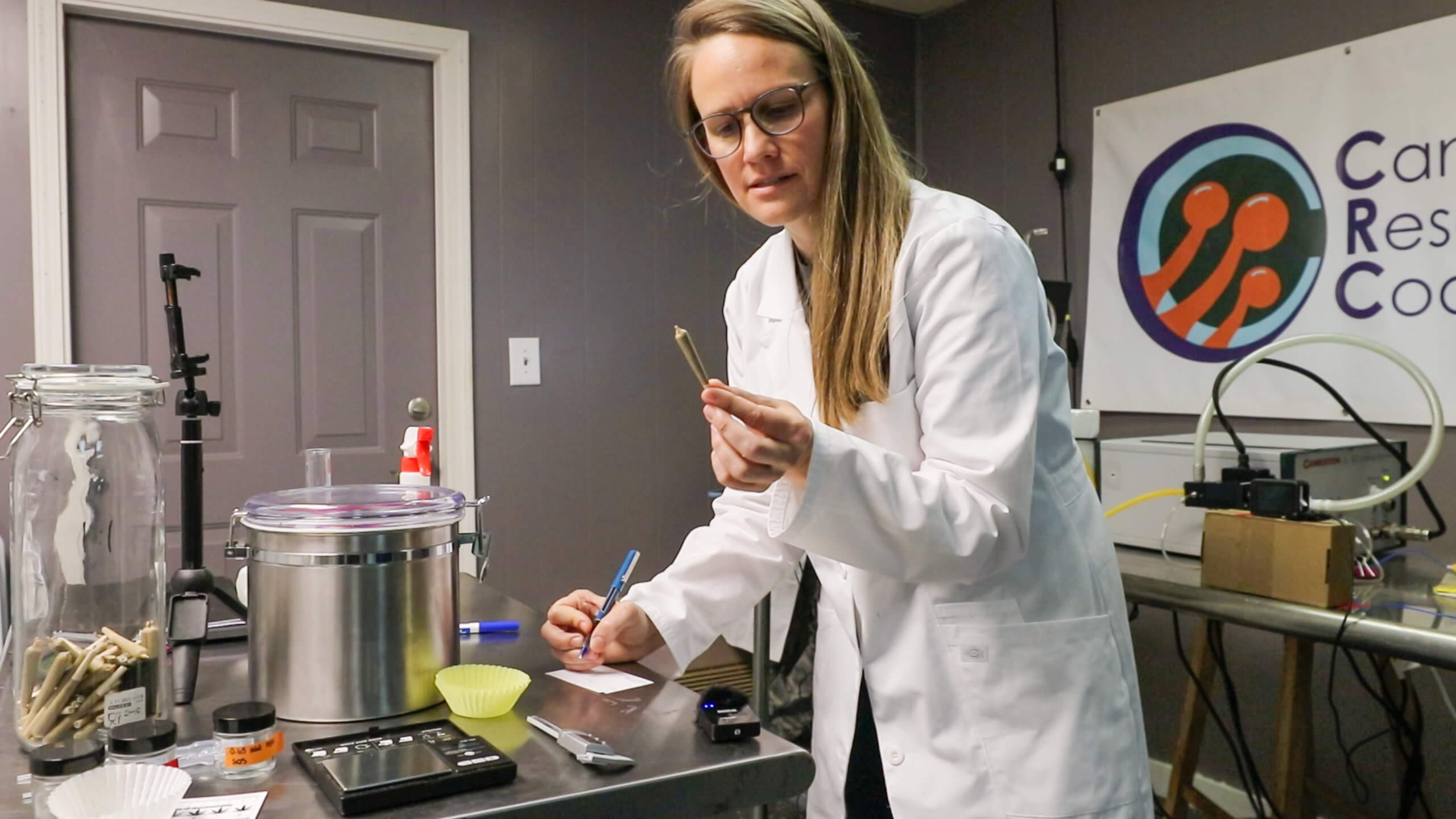
The findings from the SOS study will also be shared with ASTM International, an organization that establishes industry standards. The hope is that it leads to the development of new benchmarks for quality and safety in cannabis cultivation and product manufacturing. Moreover, by providing solid scientific data on cannabis smoke composition and quality, the study could influence cannabis policy decisions. This is particularly significant for states that are hesitant to permit smokable flower due to uncertainties about the substances produced in cannabis smoke.
For cultivators, the study could provide valuable insights into optimizing their growing techniques for better quality. Manufacturers could use the findings to improve their processing methods and create more appealing products. Retailers and budtenders could leverage the research to provide more informed recommendations to consumers.
Plus, the study’s focus on safety and quality could help address concerns about the health impacts of cannabis smoking. By identifying factors that contribute to a “safer” smoking experience, the industry could potentially mitigate some of the health risks associated with cannabis use.
At Custom Cones USA and DaySavers, we’re known for our commitment to transparency and the rigorous testing of our pre-rolled cones, as well as other products like blunt cones and the Smoke Temple Cross Cone, for pesticides, heavy metals and microbials. We do this, despite it not being required, because we believe it makes a better, safer final product for the end user. Our hope is that by focusing this study on “smokeability,” others in the industry will put the consumer first as well.
A New Kind of Study
The Science of Smokeability study marks a pivotal moment in the evolution of the cannabis industry. As the cannabis market continues to mature and evolve, research like the SOS study will be crucial in establishing cannabis as a legitimate, well-understood, and responsibly produced consumer product.
By bringing together scientific rigor, consumer experience and industry expertise, it has the potential to drive innovation, improve product quality, shape the future of cannabis cultivation and consumption.
The SOS promises to enhance our scientific understanding of cannabis as both a medicinal and recreational product, potentially revolutionizing how we approach cannabis cultivation, processing and consumption in the years to come.
And we’re excited to be a part of it.
Member Blog: Financial Services Survey – Seeking Licensed Cannabis Operators to Participate

As public opinion shifts and state and federal policies on cannabis continue to evolve, more banks and credit unions are venturing into this market. With competition intensifying, financial institutions must offer products and services that meet the changing needs of the industry.
Shield Compliance, a leading compliance platform for cannabis banking, is conducting a survey of licensed cannabis operators regarding their satisfaction with the banking partners, products, and services available to them. The survey allows licensed operators to offer valuable insights and shape financial institutions’ services going forward.
Shield welcomes all licensed cannabis operators to participate. The survey consists of short, multiple-choice questions and should only take about ten minutes to complete. You may answer the survey anonymously, or you may provide your contact information to be entered to win an Amazon gift card worth $200.
To participate in the survey, please click here or copy and paste it into your browser. Additionally, we encourage you to share this survey link with other cannabis operators within your network who may be interested in contributing to this study. The more diverse responses we receive, the more comprehensive our findings will be.
The survey will be available until August 9th.
Thank you for your participation.
Member Blog: INSIGHTS Matter – Women in Cannabis Weigh In

Earlier this year, Cannabis NewsHub reached out to successful female leaders in the cannabis community. We asked them to share insights and advice for aspiring industry professionals.
Overwhelming Success of the Social Media Campaign
Participation in this social media campaign was an overwhelming success, with more than 50 women in cannabis leadership sharing their “words of advice,” all of which were posted and shared through social media channels. See all posts on the Cannabis NewsHub website here.
Celebrating Diversity in Cannabis Leadership
The diversity of organizations was an affirmation that these women are truly “Thought Leaders” who represent cannabis in the following verticals: Advertising, Associations, Conference Development, Delivery Platforms, Dispensaries, Growers, Human Resources, Educators, Legal, Manufacturing, Marketing, Publishers, Software, and Tourism. This cross-section of verticals within the cannabis space validates the diversity of women and their roles in the industry. Their powerful advice serves as an education on how to succeed and find your path in this dynamic, ever-changing industry.
Shout-Out to Participating NCIA Members
We are proud to highlight some of the NCIA members who participated in the “Cannabis NewsHub – 2024 INSIGHTS Matter: Women in Cannabis Weigh In” campaign. These leaders are making significant contributions to the cannabis industry:
Thanks to all who participated, as well as to our friends and partners who helped to promote this campaign: BudsFeed, National Cannabis Industry Association (NCIA), the Cannabis Bar Association (INCBA), and the Association of International Certified Public Accountants (AICPA), who helped us find some of these amazing women.
For more information on Cannabis NewsHub or to be a part of our summer series, “INSIGHTS Matter: 280E”, please contact Nicole Montenegro, Marketing Manager, at nmontenegro@newsbank.com.or complete this form to participate directly.
Unlock Exclusive Savings with NCIA Membership
As a valued member of the National Cannabis Industry Association (NCIA), you can enjoy exclusive discounts on various industry services, including special offers from Cannabis NewsHub. This member benefit is designed to help you save while staying informed and connected in the cannabis industry.
Click here to learn more about the Cannabis NewsHub NCIA Member Special Offer.
Join NCIA Today to Access Member-Exclusive Benefits
Not yet a member? Now is the perfect time to join NCIA and unlock these incredible savings! As an NCIA member, you’ll gain access to a wide range of benefits, including:
- Discounts on industry services and products
- Networking opportunities with industry leaders and peers
- Educational resources to keep you updated on industry trends and best practices
- Advocacy support to help shape the future of the cannabis industry
Join NCIA today and take advantage of these member-exclusive discounts and many other benefits. Become a member now and start saving!
Committee Blog: Regulations in the Inhalable Cannabis Space – A Call for Sensible Flavor Regulation for Cannabis Vapes

Published on behalf of NCIA’s State Regulations Committee (SRC)
As the cannabis industry continues to evolve, so do the discussions around regulations, particularly concerning flavor additives in inhalable cannabis products. This blog post represents the members of NCIA’s State Regulations Committee current reflections on the successes and shortcomings of existing cannabis vape regulations, focusing on flavor limitations, safety considerations, quality specifications, and labeling practices. While technical, this topic has a tremendous impact on cannabis brands and consumer safety.
First, for those who might question the need to add flavors to cannabis vapes, it’s essential to highlight the following points regarding why flavors are added and the benefits they bring:
Restoration
In some cases, such as with cannabis distillates, processing or manufacturing techniques can alter or remove natural cannabis flavors from vape liquids. Adding cannabis flavors back simply returns the final product back to nature’s intended taste profile, providing consumers with a comprehensive vaping experience.
Mimicking Smoking Sensation
For individuals transitioning from traditional smoking to vaping, flavors can mimic the sensations and tastes they are accustomed to, making the switch more enjoyable and satisfying.
Customizing Preferences
Consumers have diverse preferences, and adding flavors allows them to customize their vaping experience based on their personal taste preferences, whether they prefer fruity profiles or classic cannabis flavors. Akin to aromatherapy, consumers may also predict the mood impression they will experience by vaping a particular flavor.
Providing Consistency
Consumers often expect certain flavors in products based on their product familiarity so it is important for brands to be able to deliver a consistent vaping experience wherever their product is sold despite changes that the consumer may otherwise notice due to harvesting variability of the cannabis or limitations on strain availability across borders.
Meeting Market Demands
The vape industry is driven by consumer demand for a wide variety of flavors. Adding flavors allows vape manufacturers to meet market demands and cater to the preferences of different consumer segments. In regions where certain flavors are restricted or banned due to regulation, the legal vape industry is challenged to compete with the illicit market, where flavors would continue to be available. However, these illicit market alternatives may not undergo the same safety and quality standards as legal vape products, potentially posing risks to consumers’ health. By offering a wide range of flavors, the legal vape industry can provide consumers with safer alternatives and help combat the proliferation of potentially unsafe, unregulated products.
Personal taste aside, the dangers of unsafe flavors in unregulated products are real, as was demonstrated in 2019 through cases of EVALI (E-cigarette or Vaping Associated Lung Injury). As detailed in this piece, manufacturers need to follow best practices to protect vaping consumers no matter if they are in regulated cannabis, unregulated cannabis, or the CBD/hemp markets.
Flavor Limitations
Overall, the addition of flavors to cannabis vapes is not just about enhancing taste but also about meeting consumer expectations and improving consumer safety. Flavors create consistency in products and are common across consumer products we already enjoy daily. Consumers are trained to expect flavor variety and consistency in traditional e-cigarettes, and cannabis vapes should be no different.
What’s Working?
We commend states like Oregon for taking a pragmatic approach by allowing a broad range of natural, artificial, and cannabis-specific flavoring ingredients while rightly prohibiting scientifically known inhalation hazards. This approach provides broad room for innovation while protecting the public from valid safety risks.
What’s Not Working?
Conversely, restrictions on flavor ingredients to only natural sources, as seen in states like Nevada, California, and New York, are unnecessarily limiting and not scientifically justified. Further limiting flavoring terpenes to being cannabis or hemp-derived, like in Connecticut, also hinders creativity, imposes higher costs, and potentially pushes consumers towards unregulated alternatives. Likewise, enforcement actions to prevent adolescent access to vapes should be prioritized over regulations to limit flavors or labels thought to be more appealing to adolescents.
Safe Flavors
Everyone’s goal should be to provide consumers with the safest possible experience when using inhalable products containing flavors. What’s safe to eat isn’t always safe to inhale.
What’s Working?
Responsible suppliers implementing robust quality and regulatory pre-qualification measures for all flavor ingredients is a positive step. Vendors should be vetted, approved, and responsible for the products they supply. Encouraging manufacturers to develop comprehensive toxicological programs tailored for inhalation safety is also crucial.
What’s Not Working?
Requiring flavors or flavor ingredients to be listed on the pharmaceutical FDA IID for inhalation is inappropriate and does not guarantee a safer flavor. The only reason flavors or flavor ingredients may be in the FDA IID is because they already exist in pharmaceutical products that went through a safety review process. However, the flavors themselves haven’t been evaluated independently for inhalation safety (emphasis added).
Instead of mandating a specific database of flavors, it’s more appropriate to regulate the process of sourcing and validating ingredients.
Quality Specifications
Once a desirable and suitable flavor has been identified, manufacturers need to understand how to maintain quality.
What’s Working?
Adhering to the approach of FDA’s Food Safety Modernization Act (FSMA) for quality plans is best practice, ensuring hazards are identified and controlled by qualified individuals at each manufacturing stage.
What’s Not Working?
Overly broad testing requirements for non-cannabis-derived flavors or multi-ingredient cannabis products are redundant and economically unviable, particularly when hazards are effectively controlled through quality plans at earlier or later stages of a supply chain.
Labeling Practices
Finally, it’s important to examine how manufacturers should disclose when flavoring has been added to products. Consumers have a right to understand if a product is flavored.
What’s Working?
Simple, consumer-friendly labeling, such as using common terms like “Natural and Artificial Flavors,” aligns with other industry standards and will be recognized by the common consumer. Adopting labels familiar to the conventional Consumer Packaged Goods (CPG) industry effectively bridges the gap between industries and aligns with how consumers already make these decisions across all products they buy.
What’s Not Working?
Listing the chemical names of all flavoring ingredients, as mandated in Oregon, New York and Missouri, is excessive and may confuse or intimidate consumers. Consumers are not qualified to assess risk from formula information. Unregulated products that do not list flavor ingredients may become more appealing to some consumers that are intimidated by the chemical names on the flavor label of the licensed product.
Recommendations
Having reasonable and consistent regulations across the country will help to create a safe and level playing field for manufacturers and brands to compete for consumer market share. While nuanced, these regulations materially impact the ability to bring a product to market or make a product economically viable.
Starting with flexible flavor definitions allows for a wide range of internationally recognized flavor ingredients, including natural, artificial, and cannabis-inspired isolates.
Banning known risks is common sense best practice. This process must be dynamic and listen to science. For example, Diacetyl, once a popular popcorn flavoring, was banned after research concluded it was unsafe for inhalation. A known, published inhalation hazard list is critical.
Implementing a safety certification policy based on thorough toxicological risk assessments specific to inhalation exposure ensures accountability.
Finally, adopting simple and recognizable labeling terms like “Natural and Artificial Flavors” and aligning allergen disclosures with established FDA and EU regulations make sense and protect intellectual property. We are advocating for consistency.
These effective regulations prioritize safety without stifling innovation or burdening stakeholders. We welcome ongoing dialogue and collaboration to develop pragmatic, science-based regulations that benefit consumers and the industry.
Committee Blog: Data-Driven Cultivation

Published by Elmar Mair, PhD on behalf of NCIA’s Cannabis Cultivation Committee
In any industry, whenever we try to optimize a process, the first step is to collect data to understand the dependencies and identify bottlenecks. In cultivation, we are still lagging behind, and we accept an average process loss of 10-20%. How can we change that?
Cannabis cultivators will lead this transformation in cultivation
Cultivating and growing plants to their full potential takes experience and specialized skills. Cannabis is no different, and many would argue, can be even more difficult to grow compared to other plants; that is because cannabis is cultivated for multiple reasons. The majority of people know that cannabis is grown for recreational and medicinal use. However, cannabis is also grown for its hemp fiber to create paper, clothing, biofuel, and food. Cannabis is an extremely fast-growing plant. The plant attracts and is susceptible to many pests, including several types of insects, fungus, and bacteria. Another challenge with cannabis is the fact that it has not been grown at scale or studied to the extent of other crops. The legal cannabis industry has only been around since 2012, when Colorado and Washington were the first states to legalize recreational use. Growing cannabis is basically like driving a race car for the first time without knowing the course ahead. Good luck. Wouldn’t you want to know more about your race car, your team, and the uniqueness of the track in order to navigate with precision and skill? That’s exactly why data is such a powerful asset in cultivation, especially for cannabis cultivators.
Switch from qualitative to quantitative data
A lot of stress, miscommunication, and conflict in cultivation operations are due to the subjective nature of data collection. We rely on humans to assess a crop’s state and remember it when comparing historic results. “It looks better than last time.” or “It looks good.” – imagine if you could rely on numbers when making such statements: “We have 10% larger flowers than last cycle” or “This cultivar stretched until day 25 compared to the other cultivar which stopped stretching around day 30”. These are statements that are easy to agree on and hard to challenge since they are objective facts.
Capture a comprehensive set of data
The other important aspect to know about data is that data becomes exponentially more valuable the more complete and comprehensive it is. If you are baking bread and you only measure the flour but not the salt, water, or yeast, there is not much value to this information. The question we need to answer is what data allows us to draw a comprehensive picture of a garden. What data do you need to remotely steer a crop and guide a team on the ground? Cultivators heavily rely on the visual feedback of plants when assessing plant health. Being able to see the plants will be key but also to get a sense of plant health in numbers to allow for quantitative comparisons. Obviously, measuring environmental parameters like air temperature, relative humidity, light intensity, and CO2 is key to operating a cultivation facility. One of the most critical parameters to optimize is the Leaf Vapor Pressure Deficit or Leaf VPD. It provides information on how the plant is transpiring and, thus, how efficiently it can grow. In order to calculate the Leaf VPD, one also needs to know the leaf temperature. Substrate properties are another key piece of the cultivation puzzle. Water content, EC, and pH are important factors to navigate. Finally, it is important to know if any pests, molds, fungus, or viruses are present in the environment. And other factors are obviously key to measuring and understanding when operating a cultivation facility, like airflow, power consumption, etc. The more data you can capture the better you can consistently bake and optimize your favorite bread.
Leverage automation and AI to capture and process the data
However, when collecting data we need to keep in mind that all environmental parameters affect the same plant and, thus, they are all intertwined – in general, changing one parameter requires the adjustment of all other parameters as well. At the same time, the impact of these decisions is often only assessed by looking at the final yield, which makes it impossible to derive what influence each decision had on the respective result. Like in many other fields, modern automation and artificial intelligence are fueling the transition to data-driven decision-making in cultivation. And Cannabis, as one of the highest margin crops, is at the forefront of this evolution. Automated, intelligent systems can monitor your crop 24/7, allowing you to focus on fixing the issues rather than identifying them. They can measure properties across the full canopy, which have not been accessible before, like leaf temperature, bud count, plant stress, pests, and other crucial factors. They enable your team to assess the garden and to discuss its state remotely as well as to compare historic data across growth cycles.
Investing in data collection means making more money
The lack of data obviously results in inconsistencies and even crop loss—in cannabis, the industry average is 15% crop loss. Translation: millions of dollars lost, which goes even higher the larger the facility. That’s a significant amount of revenue that is lost instead of being deployed in other areas for expansion or optimization. In a highly competitive industry, implementing features such as data collection to minimize crop loss and optimize yield pays off quickly and can play a huge factor in a business’s long-term success.
Igniting Conversations: NCIA’s Stakeholder Summit Series Sparks Dialogue

In recent months, the National Cannabis Industry Association (NCIA) has embarked on a journey that brought together industry leaders, regulators, policymakers, and advocates for a series of Stakeholder Summits across the United States. From the sun-drenched streets of California to the bustling cities of Maryland and the picturesque landscapes of Colorado, these events have served as a nexus for collaboration, innovation, and progress within the cannabis industry. As we reflect on the success of this inaugural Stakeholder Summit series, let’s delve deeper into the highlights and impact of these conversations which are helping to shape the future of cannabis policy nationwide.
Setting the Stage: The Vision Behind NCIA’s Stakeholder Summit Series
The Stakeholder Summit series was conceived with a singular vision: to create a platform where industry stakeholders could converge to address pressing issues, share insights, and drive positive change. With a focus on education and advocacy, these summits aimed to tackle the most significant challenges facing the cannabis industry while fostering meaningful connections and partnerships.
Insights and Impact: Highlights from the Summits
 California Stakeholder Summit: Influencing Regulatory Policies
California Stakeholder Summit: Influencing Regulatory Policies
In Sacramento, the California Stakeholder Summit 2024 was a testament to the power of collaboration and dialogue in shaping regulatory policies. Notable speakers, including Congresswoman Barbara Lee (D-Oakland) and Nicole Elliott, California’s Director of the Department of Cannabis Control (DCC), offered insights into the impending rescheduling of cannabis and the intricate relationship between state and federal regulations. Panel discussions, such as the one on AB 2223 featuring Assemblymember Cecilia Aguiar-Curry (D-Winters), provided a platform for industry operators to voice their concerns and shape regulatory policies. The summit served as a vital catalyst for driving progress in California’s cannabis industry.

Missouri Stakeholder Summit: Addressing Legislative Challenges
In St. Louis, the Missouri Stakeholder Summit convened industry leaders to address proposed legislation that could significantly impact the availability of Delta-8 THC products in the state. Amy Moore, director of the Division of Cannabis Regulation at Missouri’s Department of Health and Senior Services, highlighted the potential implications of the Intoxicating Cannabinoid Control Act on the market. The summit underscored the need for comprehensive regulations that balance consumer safety with industry growth. While discussions sparked pushback from both sides, stakeholders remain committed to finding solutions that support a thriving cannabis market in Missouri.
 Maryland Stakeholder Summit: Advancing Equity and Regulation
Maryland Stakeholder Summit: Advancing Equity and Regulation
In Baltimore, the Maryland Stakeholder Summit convened industry operators, leading regulators, and advocates to address pressing issues within the state’s cannabis landscape. Notable speakers, including Chris Jackson of ForesTree (and current Chair of NCIA’s Board of Directors), Will Tilburg of Maryland Cannabis Administration, Tracey Lancaster Miller of Maryland Dispensary Association, and Joy Strand of Maryland Wholesale Cannabis Trade Association, provided insights into key topics relevant to Maryland’s emerging adult-use cannabis industry. Discussions revolved around equity, regulatory challenges, and the path to federal regulation. Attendees actively engaged in shaping the conversation, emphasizing the need for equitable policies and inclusive regulatory frameworks. As Maryland navigates the rollout of an adult-use program, the summit produced meaningful dialogue and called for collective action towards a more equitable and sustainable industry across the state.
 Colorado Stakeholder Summit: Legislating Cannabis – Yesterday’s Framework, Today’s Challenges, Tomorrow’s Opportunities
Colorado Stakeholder Summit: Legislating Cannabis – Yesterday’s Framework, Today’s Challenges, Tomorrow’s Opportunities
In Denver, the Colorado Stakeholder Summit provided a platform for industry leaders to discuss innovations and challenges within the state’s long-standing but beleaguered cannabis marketplace. Panel discussions explored topics ranging from federal regulation pathways, legislative challenges in the Colorado market, and the future of cannabis hospitality in the state Expert panels then delved into federal regulation, and the future of cannabis hospitality. Governor Jared Polis provided a closing keynote address, where he emphasized the importance of incremental steps towards federal legalization. With a focus on rescheduling and cannabis banking reform, Governor Polis outlined these initiatives as crucial “dominoes” on the path to broader legalization. He also celebrated Colorado’s leadership in the cannabis movement while acknowledging the ongoing need for regulatory improvements, specifically by ensuring equity in Colorado’s cannabis industry. As the state reflects on a decade of legal cannabis sales, the summit highlighted the economic benefits and regulatory successes of Colorado’s cannabis landscape while also addressing current challenges in the Centennial State.
Looking Ahead: NCIA’s 12th Annual Cannabis Industry Lobby Days
As we reflect on the success of the Stakeholder Summit series, we’re excited for our upcoming 12th Annual Cannabis Industry Lobby Days event. Taking place next month, NCIA Lobby Days offers industry professionals the opportunity to advocate for policies that support a fair and equitable cannabis market. From meeting with legislators to participating in advocacy training sessions, Lobby Days provides a platform for industry stakeholders to make their voices heard. NCIA’s Lobby Days is open to all industry leaders who want to make a positive difference. Haven’t lobbied Congress before? Don’t worry. We can provide online training, talking points, and assign you to a team led by an industry colleague with past fly-in experience. Learn more and register online today.

Igniting Conversations: NCIA’s Stakeholder Summit Series Sparks Dialogue
The Stakeholder Summit series has already made a significant impact on our collective interests of continued progress across the cannabis industry, fostering collaboration, driving innovation, and advancing regulatory reform efforts. Through meaningful dialogue and engagement, stakeholders have been able to identify common challenges, explore potential solutions, and forge new partnerships. Tangible outcomes, such as policy recommendations and advocacy initiatives, have emerged from the summits, demonstrating the power of collective action within the industry. As we look ahead to future events and initiatives, we remain committed to advancing the interests of our members and the industry as a whole. Stay tuned as we continue these conversations.

 Partners in Progress:
Partners in Progress:
At NCIA, we recognize and appreciate the invaluable contributions of our sponsors and partners, each playing a unique role in the success of the Stakeholder Summit Series. Our Platinum sponsors provided invaluable support for the events and were granted the exclusive opportunity to kick off each program. Their generous contributions helped set the tone for productive discussions and meaningful engagement, making a significant impact on the success of the series. Gold sponsors were an essential element of our exhibit hall in each market. Their support ensured that attendees had access to a diverse range of resources, services, and expertise, enriching the summit experience and facilitating valuable connections within the industry. Additionally, our Silver & Advocate sponsors alongside our numerous Allied Association Partners played a crucial role in ensuring a low barrier to entry for other vital service providers and member businesses. Their support helped create a welcoming and inclusive environment, allowing a diverse array of stakeholders to participate and contribute to the vision of the Stakeholder Summit Series.
Platinum Sponsors:
A THERAPEUTIC ALTERNATIVE
Hybrid Marketing Co.
Smith Patrick CPAs
Gold Sponsors:
ENCORE LABS
FundCanna
iKrusher
Silver Sponsors:
420property
Amendment 2 Consultants (A2C)
Armada Law Corp
DOPE CFO Certified Advisors
Emerald Intel
Ganjapreneuer
Summit Virtual CFO by Anders
Vicente LLP
Advocate Sponsors:
Arvum Plant Labs (The Soil Labs)
Hunter + Esquire®
Ice Miller LLP
Snowtill
Thorburn Law Group, LLC
Allied Association Partners:
California NORML
California Cannabis Industry Association
Nevada County Cannabis Alliance
Maryland Medical Dispensary Association
Maryland Wholesale Cannabis Trade Association
Project DREAM
Colorado Leads
Marijuana Industry Group





























































Follow NCIA
Newsletter
Facebook
Twitter
LinkedIn
Instagram
News & Resource Topics
–
This Just In
How THCa Vapes Are Changing Consumer
Announcing NCIA’s 2026-2028 Board of Directors